- Home
- Ann M. Martin
Everything for a Dog Page 13
Everything for a Dog Read online
Page 13
“Good luck with that,” said Antony.
Henry left the boys in Antony’s yard, ran down the street, and knocked on Letty’s door. When she opened it, he told her the good news about Buddy.
“And to think you did this all on your own,” exclaimed Letty.
“Well, I had a little help,” said Henry.
Letty handed him the collar and the leash, and once again Henry hid them under his bed, in safekeeping for the next day’s lesson. That night he left a cookie outside the back door as usual, and tried to send a thought to Buddy, who he hoped was asleep in his shelter behind the shed. “Buddy,” he whispered, “tomorrow is going to be a very big day for you. You have to try to be cooperative and patient and brave. If you can do that, and learn to walk on the leash, then pretty soon you’ll have a real home.”
But the next morning Henry was surprised to find the cookie exactly where he had left it. It was untouched. Henry snatched it before his parents could see it, then replaced it just before they all left for the day. When he returned from school, it was still there.
Uh-oh, thought Henry. This is a problem.
It was a big problem, he felt, but he didn’t know what to do about it. He couldn’t talk to his parents, so he ran to Antony’s house.
“Have you seen Buddy?” he asked Ginny when she answered the door.
Ginny scratched her left heel with the toe of her right sneaker. “I don’t think so.”
“But you’re not sure?” Henry felt his hopes rise.
Then Antony came to the door and said that no, he hadn’t seen Buddy since the day before.
“He didn’t come to my house last night,” reported Henry. “Or if he did, he didn’t eat the cookie. And he didn’t eat it today either.”
“Uh-oh,” said Antony.
“I know,” said Henry.
“Well, maybe he found some really good food somewhere and he doesn’t want to leave it,” suggested Antony. “I’ll bet he’s not far away. I’ll bet he’ll be back tomorrow.”
“Probably,” said Henry.
That night Henry left the same cookie out for Buddy, and the next morning it was still there. It was there after school too.
“Okay, this is serious,” Henry told Antony and Owen. The boys were sitting on the stoop in front of Antony’s house. The steps had been shoveled after the last snow, but they were still wet, and everything on Tinker Lane looked melty, slushy, and gray. “The last time I saw Buddy was Wednesday,” Henry continued. “Today is Friday—and he hasn’t stayed away overnight since Christmas. Something must be wrong.”
“Maybe,” said Owen. “Or maybe he just decided to move on.”
“No. Not now. Not after all this time. Buddy was here to stay.”
Henry felt like burying his head in his arms. He had absolutely no idea what to do, and he had a feeling this was a problem he couldn’t solve on his own. If Matthew still lived here, Henry would have talked to him. They would have sat on Matthew’s stoop in the cold and the wet and one of them would have come up with an idea. But Matthew was gone, his empty house an unpleasant reminder.
Henry didn’t know Antony and Owen well enough to bury his head sadly in his arms, so instead he said, “Do you think maybe you guys could help me with Buddy?”
“Sure,” said Owen.
And from behind them a voice said, “You should organize a search party.” The boys turned to see Sofia standing in the doorway.
“Hey! That’s a good idea,” said Antony. “And we should leave cans of food around. Maybe he’ll smell the food and come back.”
“If he can,” said Sofia darkly.
Henry ignored this. “It’s a good thing he knows his name and that he learned to come when we call.”
“I’ll go find Sal and Peter and Ginny,” said Antony.
“Maybe Mackey Brannigan can help us,” added Owen.
“Maybe Letty Lewis can help too,” said Henry.
Antony groaned. “Letty? Really? Isn’t she kind of old?”
Henry shrugged. “Let’s ask her anyway.”
Half an hour later Henry was standing on Letty’s porch. Behind him, stretching back to the street, were Owen, Antony, Mackey, Sofia, Salvatore, Ginny, and Peter. Everyone was carrying something: dog chow, cans of dog food, the limited-edition cookies, Buddy’s leash, and his collar.
“My goodness. What’s all this?” asked Letty when she answered the doorbell.
“Buddy’s missing,” Henry announced.
Letty put her hand to her cheek. “Oh, no. Are you sure?”
“The last time I saw him was Wednesday afternoon.”
“And now it’s Friday,” said Letty thoughtfully.
“He’s been coming to my house every single night,” Henry told her. “To eat these.” He held out the bag of cookies. “So I think something might be wrong.”
“We’ve organized a search party,” said Sofia, stepping forward hesitantly.
“And we’re going to leave food all over the place for Buddy,” spoke up Sal.
“Do you want to help us?” asked Henry.
“Well,” said Letty. “I . . .”
Henry realized that Letty was wearing a bathrobe and a pair of moccasins. Her hair looked a bit wild.
“I want to help, but I’m not sure I’ll be much good at searching,” confessed Letty. “I could put some food around my yard, though. Just let me get dressed.”
Henry left Letty with two cans of food and a supply of chow, and he and the others returned to Antony’s house.
“This will be Command Center,” said Owen. “Henry, you give out the orders.”
“Oh,” said Henry. “Okay. Um, let’s see. There are eight of us. I think we should divide into three teams. Antony, you come with me. Owen, you’ll be in charge of Peter and Ginny. Salvatore and Sofia will report to Mackey. Everybody, make sure you take some food with you. Mackey, your team will stay here in our neighborhood. Owen, you guys go into town. Antony and I will look in the yards around Caldwell Street.” Henry checked his watch, feeling very official. “Meet back here in one hour exactly.”
“Hey, what do we do if we find Buddy?” asked Mackey. “We only have one collar and leash.”
“Good point,” said Henry. He thought for a moment. “Well, two teams will just have to use rope. We have some in my garage. But be really careful with it, okay? Put it around Buddy’s middle, not his neck, and don’t tie it too tight.”
Fifteen minutes later the teams set out. Henry and Antony, carrying a bag containing food, cookies, the leash, and the collar, walked through Antony’s backyard and into the backyards of the houses on Caldwell Street. They peeked behind garbage cans. They peered into garages.
“Maybe someone went away on a trip and Buddy got locked in the garage,” said Henry. But most of the garages they saw were open. And Antony pointed out that they couldn’t check all the garages in Claremont anyway.
At the edges of several yards, Henry and Antony furtively left cans of food or small piles of dog chow.
“Don’t let anyone see you,” said Henry in a low voice. “And sort of hide the food. It might attract raccoons, and people won’t like that.”
They asked anyone they met if a medium-size tan dog with short fur and brown eyes had been seen in the neighborhood. But the reply was always a shake of the head or a “No, sorry.”
When they had been searching for forty-five minutes, Antony sighed and said, “I guess we should start back now.”
“Let’s leave a trail of chow behind us,” suggested Henry, no longer caring about raccoons. “Buddy might find it and follow it back to my house.”
“I guess,” said Antony. He sounded doubtful, but they carefully sprinkled chow all the way back to Buddy’s shelter in Henry’s yard.
“There are the others,” said Antony a few moments later, squinting down Tinker Lane. The search parties had returned.
“Anything?” Henry asked, running to his friends.
In answer, six heads swiveled slowly fr
om side to side.
No.
An uncomfortable chilly sensation blossomed in Henry’s stomach and spread down his arms and legs. He wasn’t cold. In fact, all the activity had made him hot and sweaty. But he realized he was very afraid.
The chill that settled into Henry made him feel numb. He couldn’t eat his dinner. And he found that he didn’t want to do anything that evening except peer out into the murky nighttime, hoping to see Buddy lope through the backyard.
At eight o’clock he told his parents he was going to bed. They exchanged a look of concern.
“I think you’re coming down with something,” said his mother, resting her cool hand on his forehead. “You don’t seem to have a fever, though.”
“Anything the matter, son?” asked his father.
Henry shook his head, then fled to his room before tears could begin to fall. He turned out the light and knelt on his bed, now hoping to see Buddy in the front yard, in the glow of a streetlight. Or maybe he was across the street at Matthew’s! Maybe Buddy had discovered a way in and out of the empty house and had made a home for himself there. Henry’s heart leaped. But then he realized that if Buddy were just across the street, he could easily come by for his cookies. He rested his head on the windowsill and began to cry quietly. It had been a long time since he had cried and he’d forgotten how hot the rush of tears would be and how his chest would ache.
When the hand touched his shoulder he jumped.
“Sorry,” said his father softly. “Didn’t mean to startle you.”
Henry wiped his eyes on the sleeve of his pajamas. “I didn’t hear you come in.”
“Do you want to tell me what’s going on?”
“I can’t.” Henry slid under the covers, and his father turned the light on.
“I think you’ll feel better if you talk about it.”
“Not necessarily.”
“Are you in trouble?”
Henry shook his head.
“Is someone else in trouble?”
Henry looked miserably at his father. “Sort of.”
“A friend? Someone at school?”
“The person isn’t a person, exactly. The person is more of a dog.”
There. He had said it.
“A dog is in trouble?” repeated Mr. Elliot. He looked puzzled. “What dog?”
“Buddy,” Henry whispered.
“Henry, I think you’d better start at the beginning and tell me the whole story.”
“Okay,” said Henry, and he sat up straighter and said boldly, “I have a secret outdoor dog.” And then the rest of the story poured out.
Mr. Elliot listened patiently. Henry waited for his father to reprimand him or scold him or at the very least point out that Henry had disobeyed him. But his father rested his hand on Henry’s shoulder and nodded and occasionally asked a question.
At last, Henry, his voice wobbling slightly, reached the end of the tale, winding up by saying that none of the search parties had seen any sign of Buddy. He traced his finger along a wrinkle in the blanket, glanced up at his father, and then looked down at his covers again. And then he burst into tears.
Mr. Elliot drew his son close and said, “You did a good thing, Henry. Tomorrow morning, as soon as it’s light, I’ll help you search for Buddy.”
17. HENRY
Henry was sleeping soundly when he felt someone sit on the edge of his bed. He opened his eyes, but saw only inky darkness. “Dad?” he said.
“We need to get an early start,” his father replied softly.
Henry realized that the sun hadn’t risen yet. He raised himself onto his elbows and yawned. “Okay.”
“By the time we eat breakfast it will be light enough to set out.”
Henry and his father sat at the table in the kitchen and ate eggs and oatmeal and toast. In the east the sky was brightening, turning heavy, dull clouds from black to a deep gray. There would be no sunshine that day.
“Wear your warmest clothes,” Mr. Elliot said as he and Henry cleared the table. “It’s going to be raw.”
“Where do you think we should look?” asked Henry. “Yesterday we looked on Tinker Lane and Caldwell Street and also in town.”
“I think we should start with the woods,” said Mr. Elliot.
Henry dressed for the long cold day ahead and opened the front door. Behind him, the rest of the household was waking. He saw his mother at the top of the stairs in her bathrobe, her hair rumpled from sleep. Amelia Earhart was sitting on the bottom step washing her face with her eyes closed.
Henry reached up to touch the hat Aunt Susan had made. The wool was vaguely scratchy. He wore the hat frequently anyway, and today he hoped it would bring good luck, since his great-aunt was the one who had told him about Sunny, and Henry had a feeling that that moment on Christmas Eve was somehow responsible for this early morning adventure with his father.
Henry looked across the street at Matthew’s house with its dead windows and unshoveled walk, the snow piled high at the bottom of the driveway. Above the house towered clouds so thick Henry thought he might be able to scoop out handfuls of them.
“We’ll see you later,” said Henry’s father to his mother.
“Be careful,” she replied.
Mr. Elliot closed the door softly and looked at the clouds. “They’re talking about more snow,” he said. Henry and his father made their way across the yard to the street, turned left, walked past the DEAD END sign, and managed to locate the snow-covered trail that led up the mountain. “Keep your eyes and ears open,” Mr. Elliot told Henry. “Don’t watch the trail, watch everything around you. Look for movement among the trees and listen for sounds.”
“What kinds of sounds?” asked Henry.
“The crunching of leaves. Barking, whining.”
They walked along in silence, breaking it only to call for Buddy. Henry’s father was wearing a backpack containing dog food. Henry was wearing a backpack containing the lunch they had prepared. They looked and listened, and sometimes Mr. Elliot stood still and cocked his head or stared at things in the distance. Every so often they opened a can of food and dumped its contents near the trail. Henry’s father refused to leave the cans in the woods. “We’ll take them home and recycle them. It’s not fair to the woods to leave our trash behind.”
By noon they were more than halfway up the mountain. Henry was getting used to hearing nothing but their own calls and footsteps, the wind in the fir trees, the cawing of crows, the sudden crack of breaking twigs as a startled deer leaped away through the underbrush. He was hot and sweating and very hungry.
“Should we stop and have lunch?” asked his father.
“Yes!” exclaimed Henry, and Mr. Elliot laughed.
They found a large rock, swept it free of the snow—a layer as thin as a piece of paper—that had managed to find its way through the branches of the pine trees, and spread their lunch on the blanket Henry had packed in case Buddy needed warming up when they found him.
“This reminds me of when I was a boy and Sunny and I would take hikes through the woods,” said Mr. Elliot.
“You and Sunny used to go on hikes?” asked Henry.
“Lots of them. I’d pack lunch and a book to read and we’d spend the afternoon—or sometimes the entire day—in the woods.”
Henry was incredulous. “You and Sunny spent a lot of time in the woods?” When Henry thought of his father as a boy he pictured him as a younger, smaller version of his adult self—a ten-year-old librarian. He had never once pictured his father tramping through a forest with a dog, knowing woodsy outdoor things.
“Yes,” said Mr. Elliot. “Especially after RJ died. We were both lonely then. And Sunny was my . . .”
“Your best friend?”
His father lifted his head but said nothing.
Henry followed his gaze. He squinted at the sky. “No snow yet,” he said.
“We’d better pack up and get going. We’ll only have a few more hours of daylight. Time to head home.”
<
br /> They left the trail and went slipping and sliding down the side of the mountain. Henry kept falling and grew very annoyed, but Mr. Elliot said there was no point in going back the way they’d come. “We’d be covering the same territory.”
“What about the food?” asked Henry as they neared the bottom. “We have to check to see if Buddy ate it.” His annoyance had turned to panic. They couldn’t go home yet. They were supposed to have found Buddy by now. Henry was wearing his lucky hat. And searching with his father.
“We’ll check some of the food tomorrow when we set out again.”
“Tomorrow?” wailed Henry. “I thought . . .”
Mr. Elliot put his hands on Henry’s shoulders. “Take it easy. We’ll start over again tomorrow.”
And they did. The threatened snow did not fall and Sunday dawned with a brilliant pink sky beyond the mountains. Once again Henry and his father set off with their laden backpacks. They started out on the trail so that they could look for the food.
“I know we left some here!” called Henry. “And it’s gone!” He paused. “But Dad, a raccoon or something could have eaten it.” He leaned down. “There are little tracks in the snow. Little tracks. Not Buddy’s.”
Farther along the trail they found the remains of some more food. “Bigger tracks here!” cried Henry. And then he shouted, “Buddy! Buddy!” but there was no answering bark.
They left the trail then, traveling east instead of west, hiking along through snow and stumbling over rocks. By noon they were on a rise above town and they ate their lunch looking down at Claremont—at the streets and rooftops and treetops. “Hey,” said Henry, “I can see our house from here.” But he found no comfort in this, and when he turned to his father he felt his lip trembling. Only three or four more hours of searching were left and the next day was Monday. Back to school, back to work.
His father gave him a hug. Then he stood up. “Let’s not waste the daylight.”
Henry slogged along through the snow, trying to listen, trying to observe, trying to do everything his father was doing.
But the weekend was over.
“At least it didn’t snow,” said Henry.

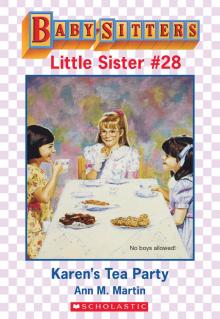 Karen's Tea Party
Karen's Tea Party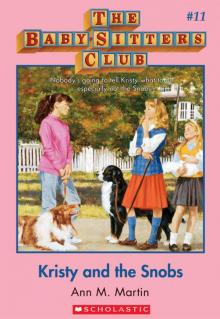 Kristy and the Snobs
Kristy and the Snobs Best Kept Secret
Best Kept Secret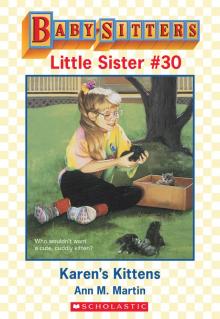 Karen's Kittens
Karen's Kittens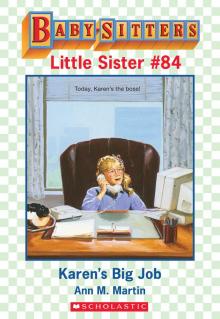 Karen's Big Job
Karen's Big Job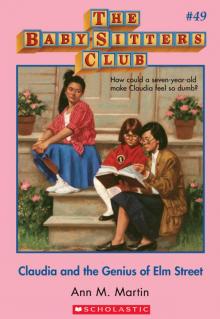 Claudia and the Genius of Elm Street
Claudia and the Genius of Elm Street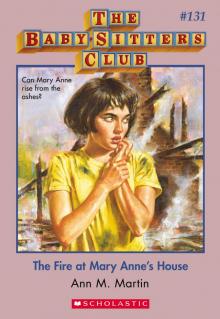 The Fire at Mary Anne's House
The Fire at Mary Anne's House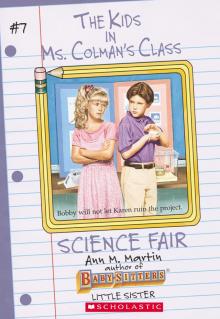 Science Fair
Science Fair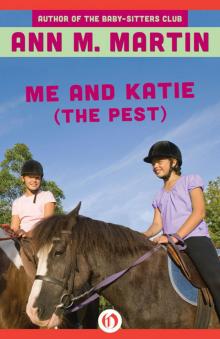 Me and Katie (The Pest)
Me and Katie (The Pest)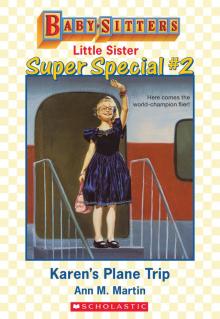 Karen's Plane Trip
Karen's Plane Trip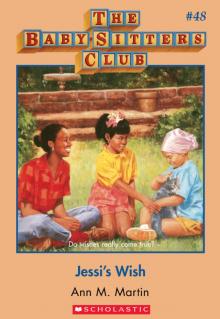 Jessi's Wish
Jessi's Wish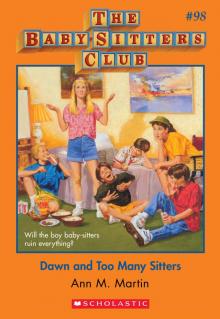 Dawn and Too Many Sitters
Dawn and Too Many Sitters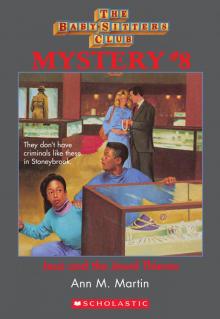 Jessi and the Jewel Thieves
Jessi and the Jewel Thieves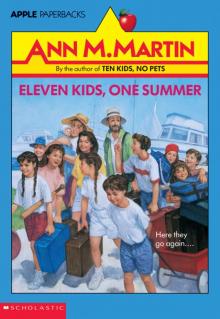 Eleven Kids, One Summer
Eleven Kids, One Summer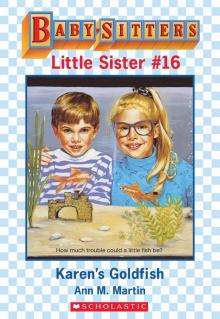 Karen's Goldfish
Karen's Goldfish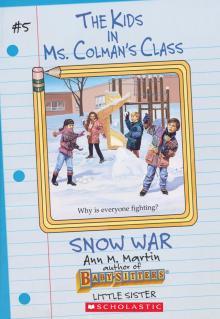 Snow War
Snow War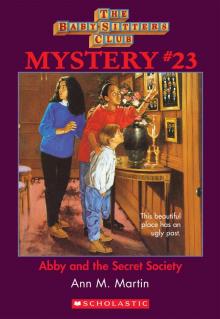 Abby and the Secret Society
Abby and the Secret Society Keeping Secrets
Keeping Secrets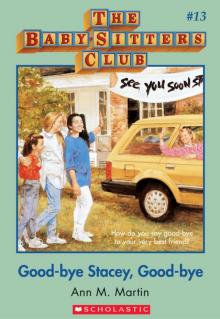 Good-Bye Stacey, Good-Bye
Good-Bye Stacey, Good-Bye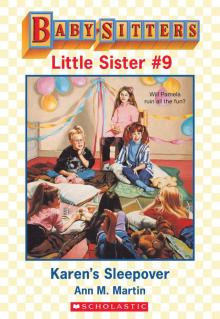 Karen's Sleepover
Karen's Sleepover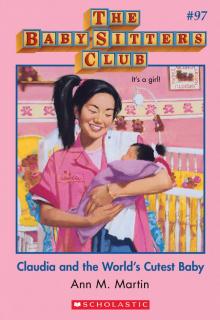 Claudia and the World's Cutest Baby
Claudia and the World's Cutest Baby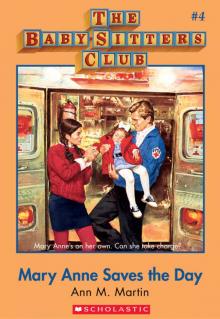 Mary Anne Saves the Day
Mary Anne Saves the Day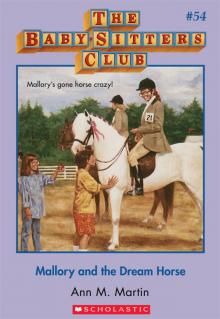 Mallory and the Dream Horse
Mallory and the Dream Horse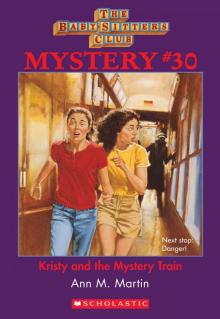 Kristy and the Mystery Train
Kristy and the Mystery Train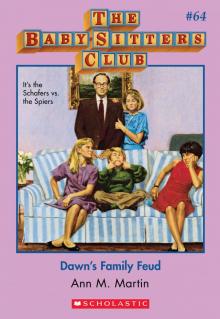 Dawn's Family Feud
Dawn's Family Feud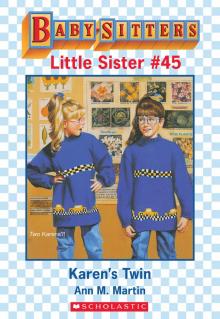 Karen's Twin
Karen's Twin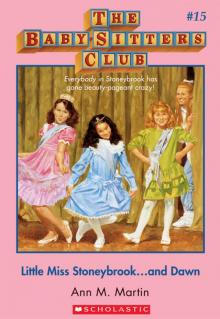 Little Miss Stoneybrook... And Dawn
Little Miss Stoneybrook... And Dawn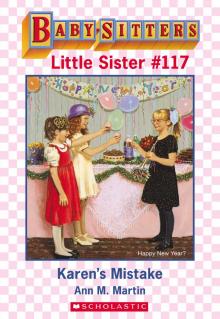 Karen's Mistake
Karen's Mistake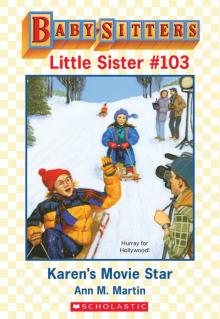 Karen's Movie Star
Karen's Movie Star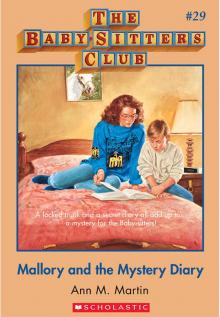 Mallory and the Mystery Diary
Mallory and the Mystery Diary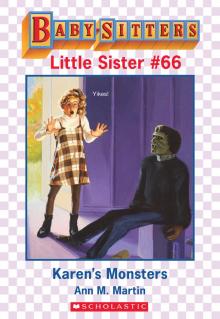 Karen's Monsters
Karen's Monsters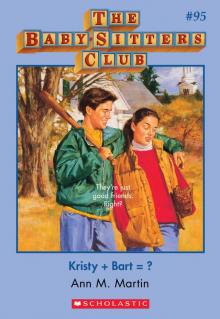 Kristy + Bart = ?
Kristy + Bart = ?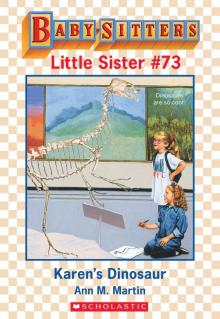 Karen's Dinosaur
Karen's Dinosaur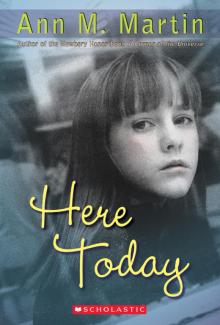 Here Today
Here Today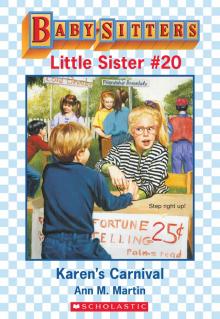 Karen's Carnival
Karen's Carnival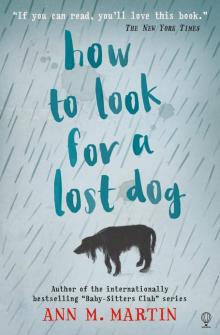 How to Look for a Lost Dog
How to Look for a Lost Dog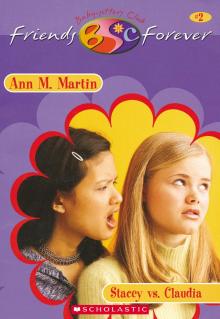 Stacey vs. Claudia
Stacey vs. Claudia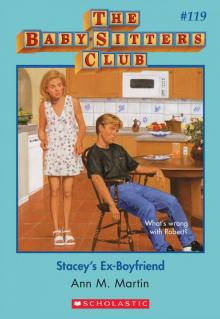 Stacey's Ex-Boyfriend
Stacey's Ex-Boyfriend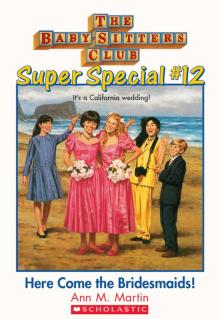 Here Come the Bridesmaids!
Here Come the Bridesmaids! Graduation Day
Graduation Day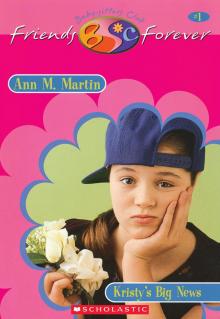 Kristy's Big News
Kristy's Big News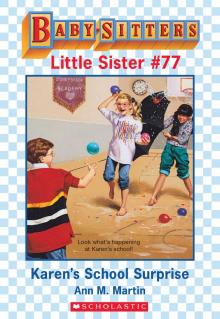 Karen's School Surprise
Karen's School Surprise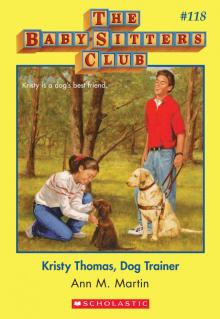 Kristy Thomas, Dog Trainer
Kristy Thomas, Dog Trainer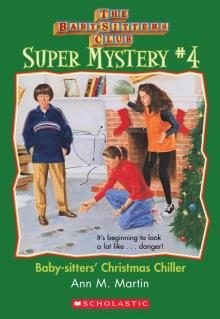 Baby-Sitters' Christmas Chiller
Baby-Sitters' Christmas Chiller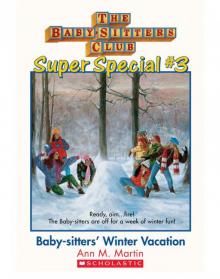 Baby-Sitters' Winter Vacation
Baby-Sitters' Winter Vacation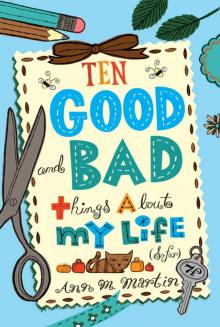 Ten Good and Bad Things About My Life
Ten Good and Bad Things About My Life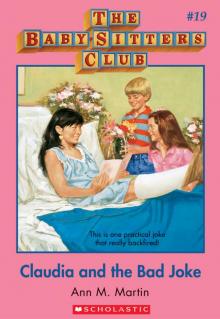 Claudia and the Bad Joke
Claudia and the Bad Joke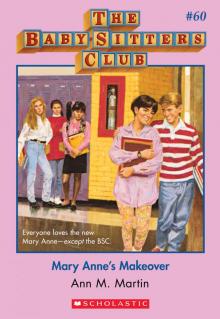 Mary Anne's Makeover
Mary Anne's Makeover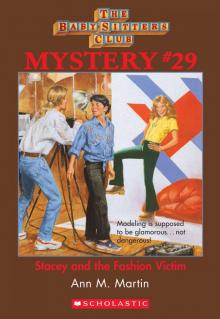 Stacey and the Fashion Victim
Stacey and the Fashion Victim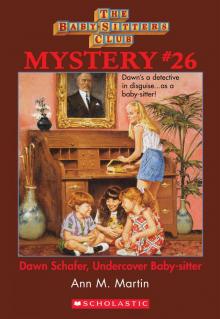 Dawn Schafer, Undercover Baby-Sitter
Dawn Schafer, Undercover Baby-Sitter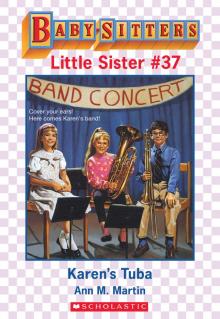 Karen's Tuba
Karen's Tuba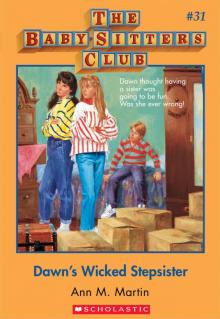 Dawn's Wicked Stepsister
Dawn's Wicked Stepsister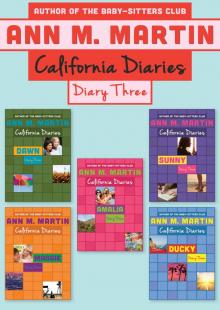 Diary Three: Dawn, Sunny, Maggie, Amalia, and Ducky
Diary Three: Dawn, Sunny, Maggie, Amalia, and Ducky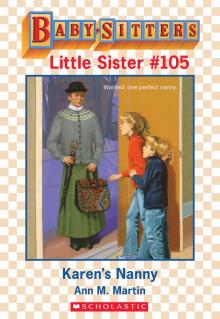 Karen's Nanny
Karen's Nanny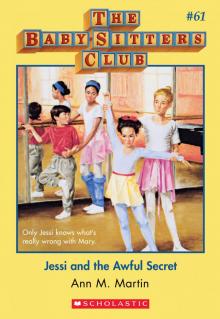 Jessi and the Awful Secret
Jessi and the Awful Secret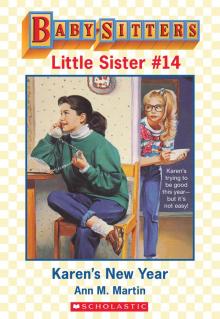 Karen's New Year
Karen's New Year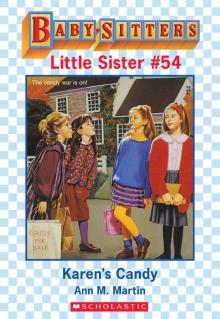 Karen's Candy
Karen's Candy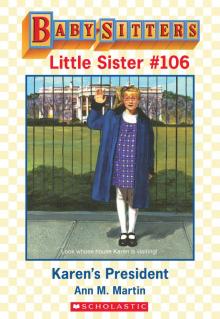 Karen's President
Karen's President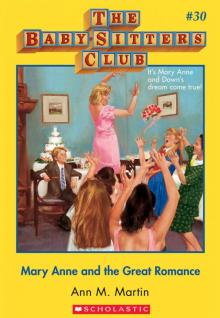 Mary Anne and the Great Romance
Mary Anne and the Great Romance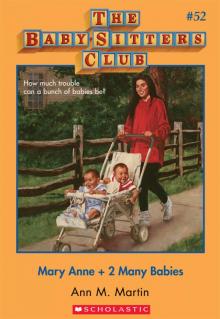 Mary Anne + 2 Many Babies
Mary Anne + 2 Many Babies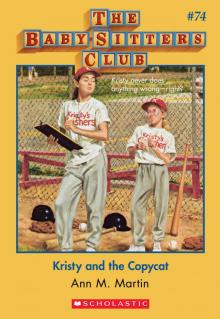 Kristy and the Copycat
Kristy and the Copycat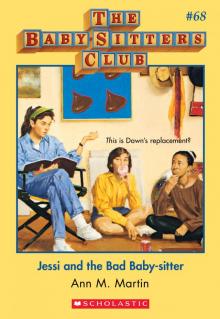 Jessi and the Bad Baby-Sitter
Jessi and the Bad Baby-Sitter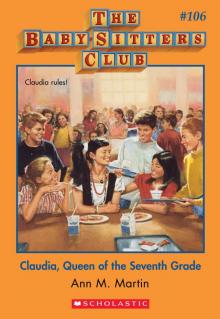 Claudia, Queen of the Seventh Grade
Claudia, Queen of the Seventh Grade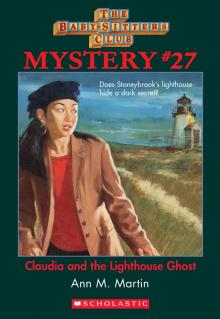 Claudia and the Lighthouse Ghost
Claudia and the Lighthouse Ghost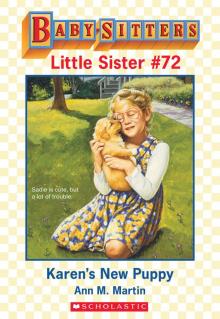 Karen's New Puppy
Karen's New Puppy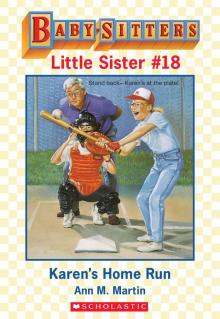 Karen's Home Run
Karen's Home Run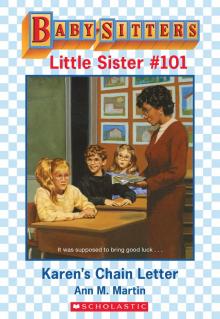 Karen's Chain Letter
Karen's Chain Letter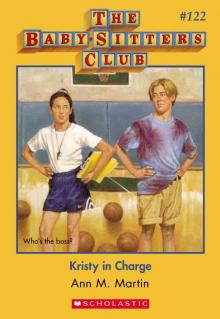 Kristy in Charge
Kristy in Charge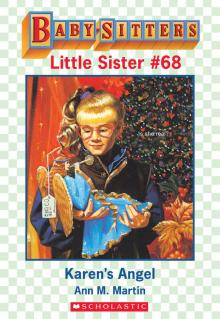 Karen's Angel
Karen's Angel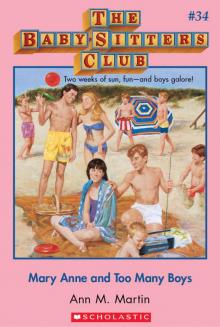 Mary Anne and Too Many Boys
Mary Anne and Too Many Boys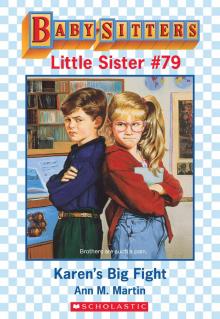 Karen's Big Fight
Karen's Big Fight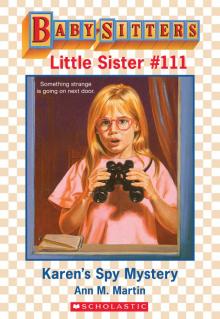 Karen's Spy Mystery
Karen's Spy Mystery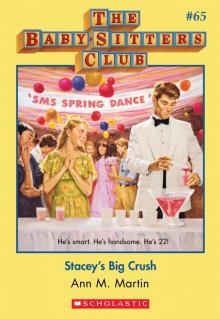 Stacey's Big Crush
Stacey's Big Crush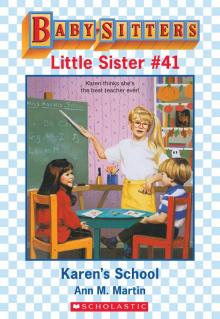 Karen's School
Karen's School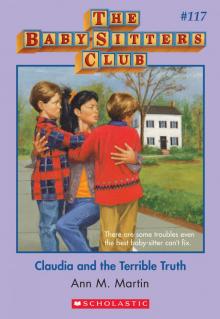 Claudia and the Terrible Truth
Claudia and the Terrible Truth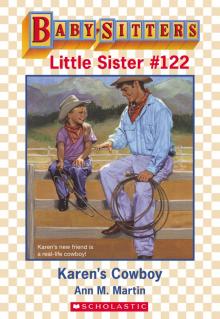 Karen's Cowboy
Karen's Cowboy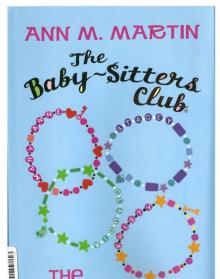 The Summer Before
The Summer Before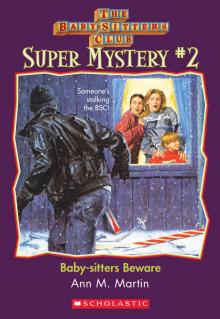 Beware, Dawn!
Beware, Dawn!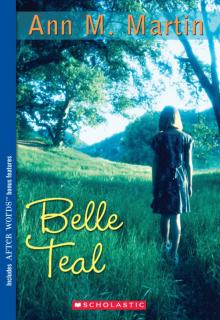 Belle Teale
Belle Teale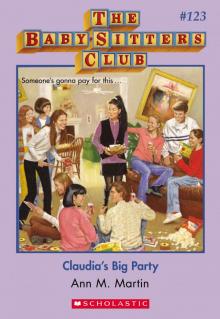 Claudia's Big Party
Claudia's Big Party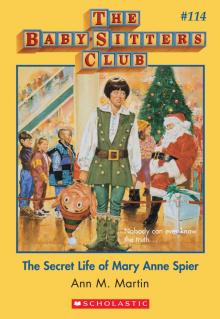 The Secret Life of Mary Anne Spier
The Secret Life of Mary Anne Spier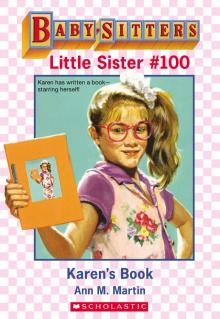 Karen's Book
Karen's Book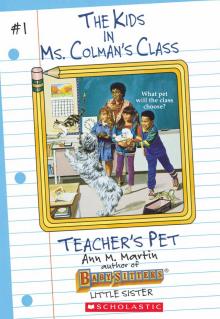 Teacher's Pet
Teacher's Pet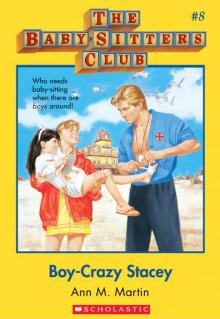 Boy-Crazy Stacey
Boy-Crazy Stacey Claudia and the Disaster Date
Claudia and the Disaster Date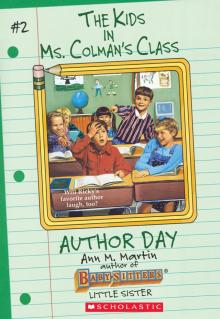 Author Day
Author Day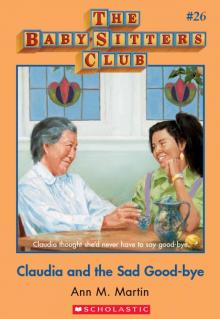 Claudia and the Sad Good-Bye
Claudia and the Sad Good-Bye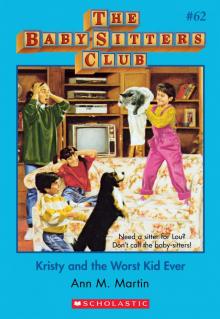 Kristy and the Worst Kid Ever
Kristy and the Worst Kid Ever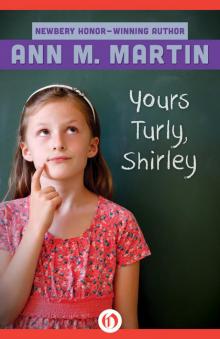 Yours Turly, Shirley
Yours Turly, Shirley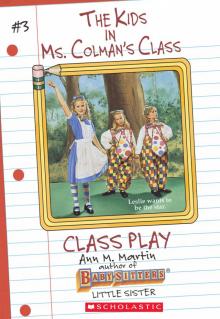 Class Play
Class Play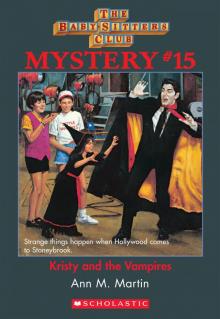 Kristy and the Vampires
Kristy and the Vampires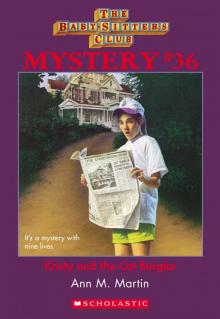 Kristy and the Cat Burglar
Kristy and the Cat Burglar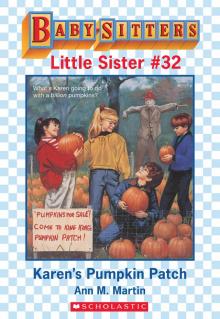 Karen's Pumpkin Patch
Karen's Pumpkin Patch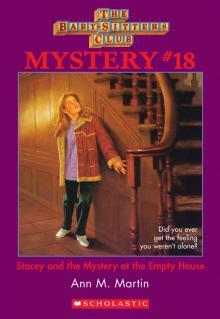 Stacey and the Mystery at the Empty House
Stacey and the Mystery at the Empty House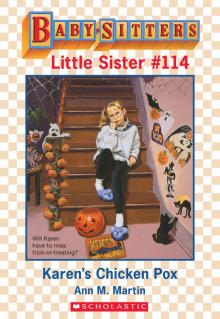 Karen's Chicken Pox
Karen's Chicken Pox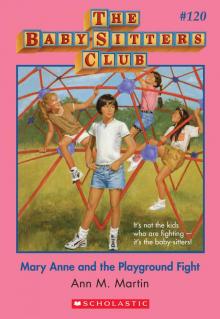 Mary Anne and the Playground Fight
Mary Anne and the Playground Fight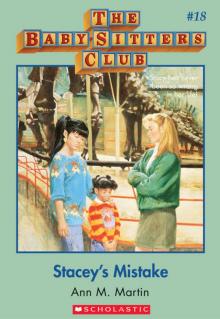 Stacey's Mistake
Stacey's Mistake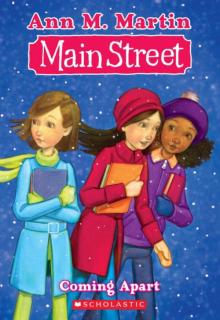 Coming Apart
Coming Apart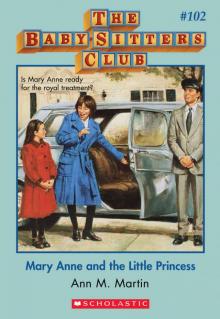 Mary Anne and the Little Princess
Mary Anne and the Little Princess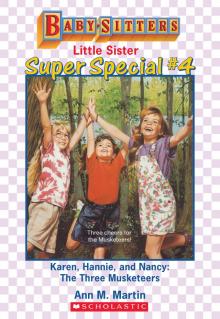 Karen, Hannie and Nancy: The Three Musketeers
Karen, Hannie and Nancy: The Three Musketeers 'Tis the Season
'Tis the Season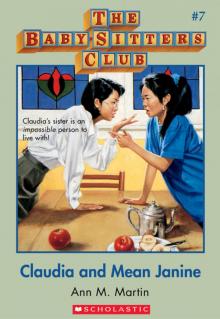 Claudia and Mean Janine
Claudia and Mean Janine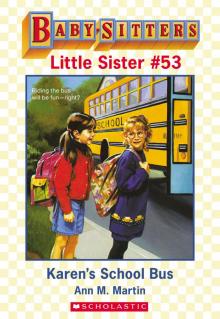 Karen's School Bus
Karen's School Bus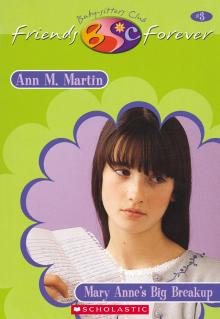 Mary Anne's Big Breakup
Mary Anne's Big Breakup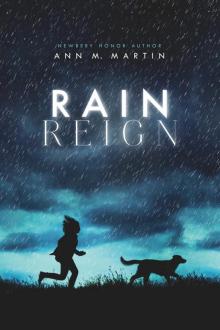 Rain Reign
Rain Reign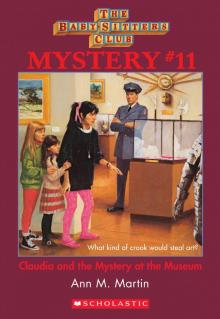 Claudia and the Mystery at the Museum
Claudia and the Mystery at the Museum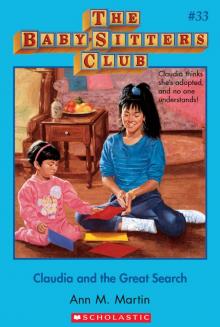 Claudia and the Great Search
Claudia and the Great Search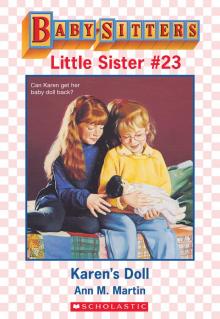 Karen's Doll
Karen's Doll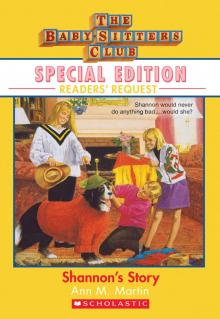 Shannon's Story
Shannon's Story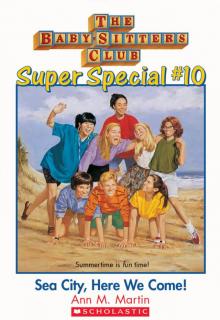 Sea City, Here We Come!
Sea City, Here We Come!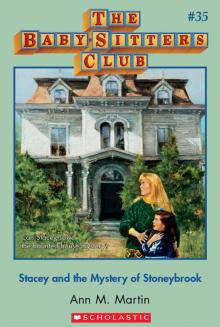 Stacey and the Mystery of Stoneybrook
Stacey and the Mystery of Stoneybrook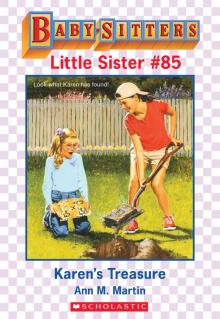 Karen's Treasure
Karen's Treasure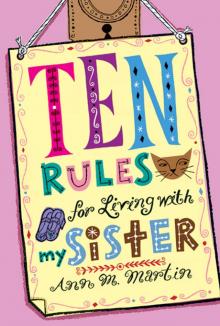 Ten Rules for Living With My Sister
Ten Rules for Living With My Sister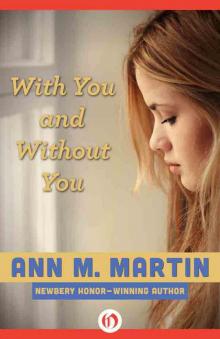 With You and Without You
With You and Without You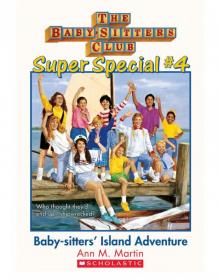 Baby-Sitters' Island Adventure
Baby-Sitters' Island Adventure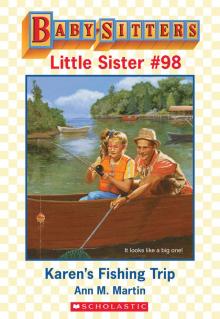 Karen's Fishing Trip
Karen's Fishing Trip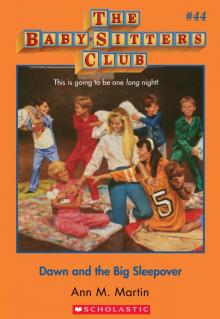 Dawn and the Big Sleepover
Dawn and the Big Sleepover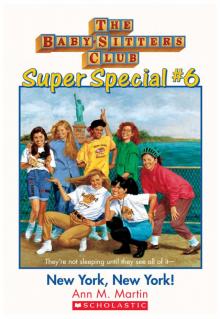 New York, New York!
New York, New York!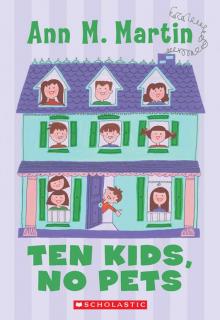 Ten Kids, No Pets
Ten Kids, No Pets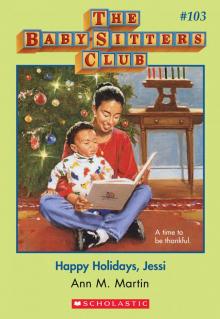 Happy Holidays, Jessi
Happy Holidays, Jessi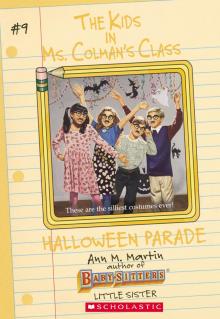 Halloween Parade
Halloween Parade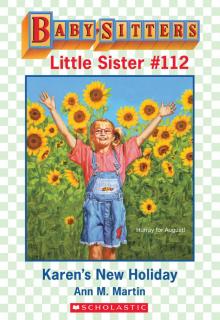 Karen's New Holiday
Karen's New Holiday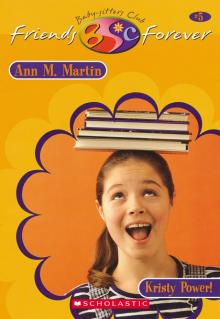 Kristy Power!
Kristy Power!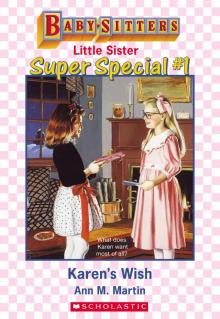 Karen's Wish
Karen's Wish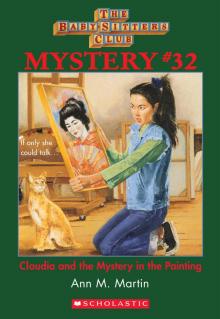 Claudia and the Mystery in the Painting
Claudia and the Mystery in the Painting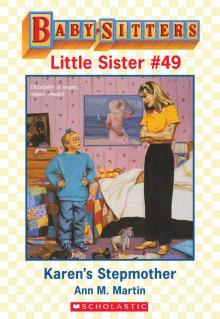 Karen's Stepmother
Karen's Stepmother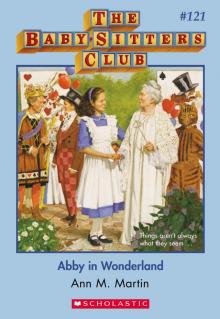 Abby in Wonderland
Abby in Wonderland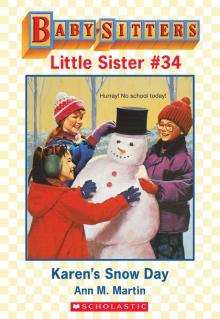 Karen's Snow Day
Karen's Snow Day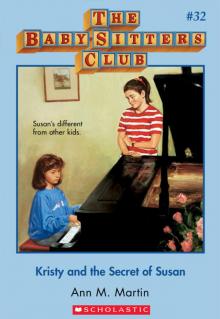 Kristy and the Secret of Susan
Kristy and the Secret of Susan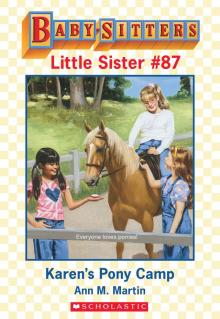 Karen's Pony Camp
Karen's Pony Camp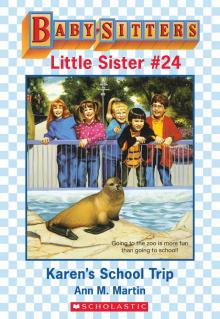 Karen's School Trip
Karen's School Trip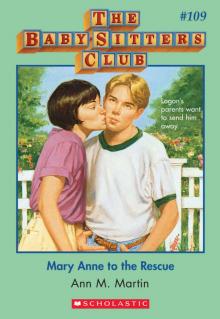 Mary Anne to the Rescue
Mary Anne to the Rescue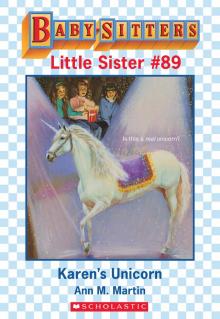 Karen's Unicorn
Karen's Unicorn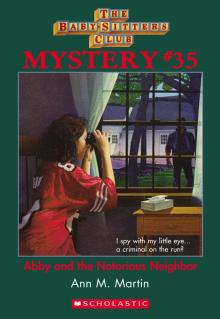 Abby and the Notorious Neighbor
Abby and the Notorious Neighbor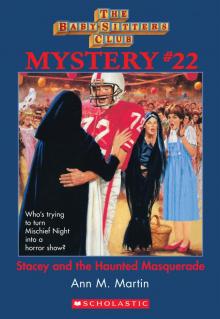 Stacey and the Haunted Masquerade
Stacey and the Haunted Masquerade Claudia Gets Her Guy
Claudia Gets Her Guy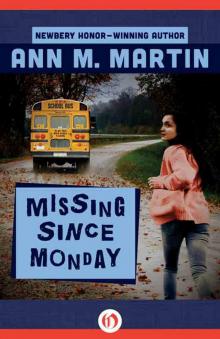 Missing Since Monday
Missing Since Monday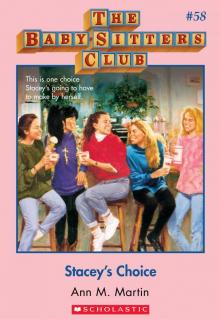 Stacey's Choice
Stacey's Choice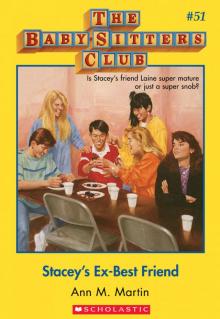 Stacey's Ex-Best Friend
Stacey's Ex-Best Friend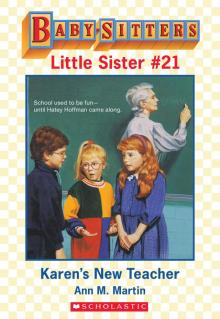 Karen's New Teacher
Karen's New Teacher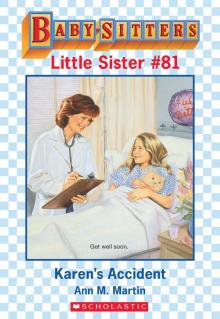 Karen's Accident
Karen's Accident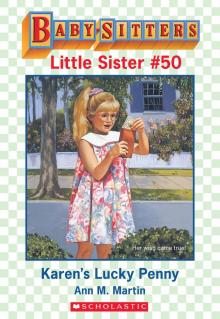 Karen's Lucky Penny
Karen's Lucky Penny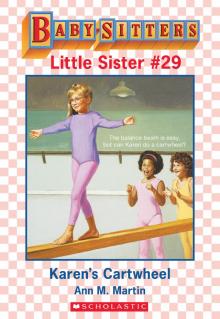 Karen's Cartwheel
Karen's Cartwheel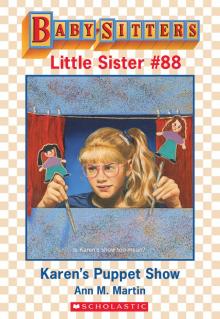 Karen's Puppet Show
Karen's Puppet Show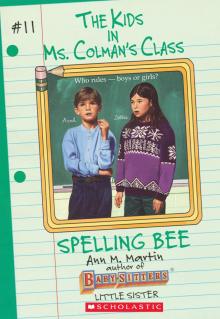 Spelling Bee
Spelling Bee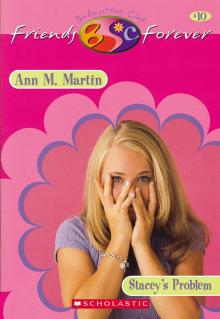 Stacey's Problem
Stacey's Problem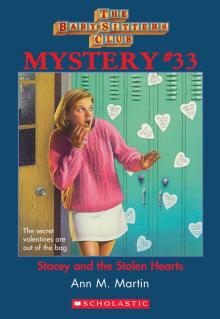 Stacey and the Stolen Hearts
Stacey and the Stolen Hearts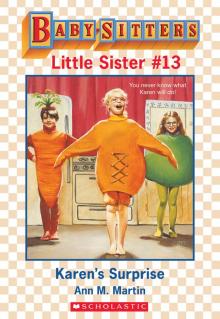 Karen's Surprise
Karen's Surprise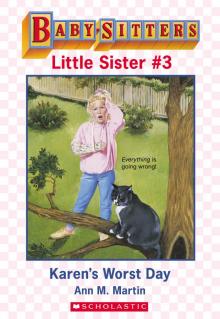 Karen's Worst Day
Karen's Worst Day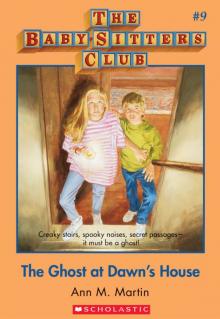 The Ghost at Dawn's House
The Ghost at Dawn's House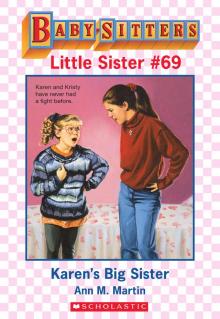 Karen's Big Sister
Karen's Big Sister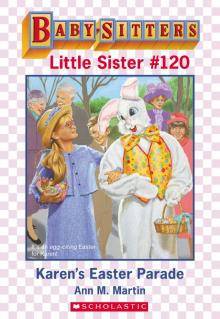 Karen's Easter Parade
Karen's Easter Parade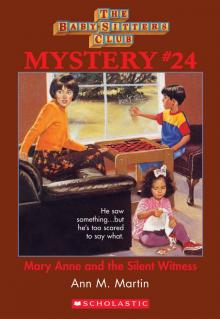 Mary Anne and the Silent Witness
Mary Anne and the Silent Witness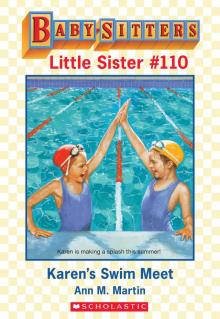 Karen's Swim Meet
Karen's Swim Meet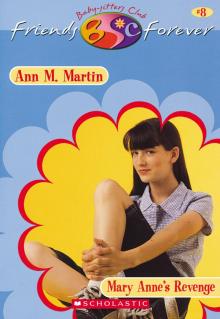 Mary Anne's Revenge
Mary Anne's Revenge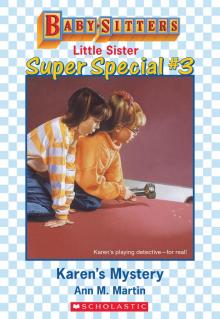 Karen's Mystery
Karen's Mystery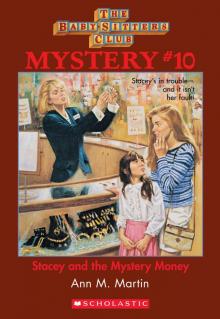 Stacey and the Mystery Money
Stacey and the Mystery Money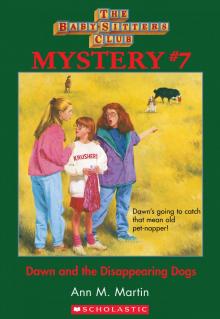 Dawn and the Disappearing Dogs
Dawn and the Disappearing Dogs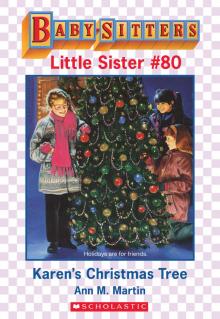 Karen's Christmas Tree
Karen's Christmas Tree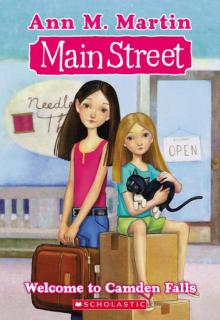 Welcome to Camden Falls
Welcome to Camden Falls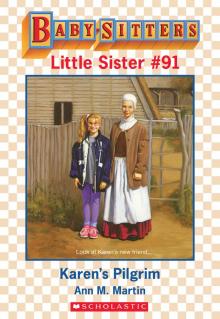 Karen's Pilgrim
Karen's Pilgrim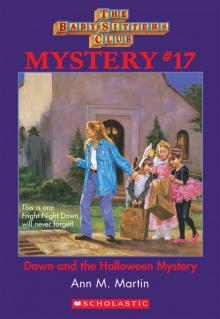 Dawn and the Halloween Mystery
Dawn and the Halloween Mystery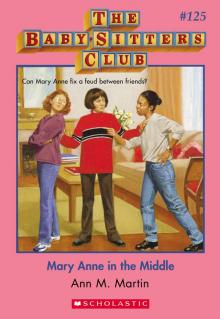 Mary Anne in the Middle
Mary Anne in the Middle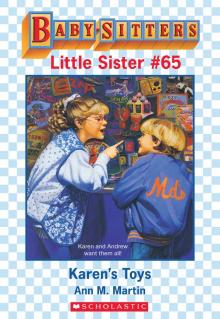 Karen's Toys
Karen's Toys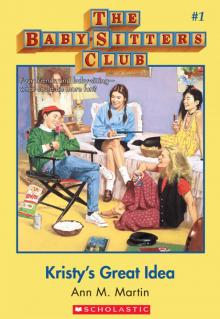 Kristy's Great Idea
Kristy's Great Idea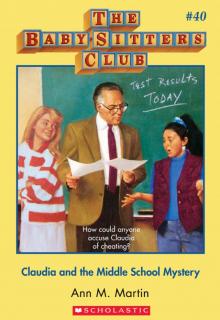 Claudia and the Middle School Mystery
Claudia and the Middle School Mystery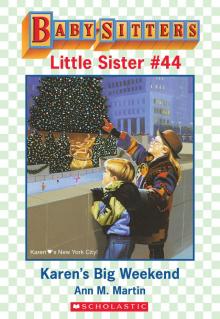 Karen's Big Weekend
Karen's Big Weekend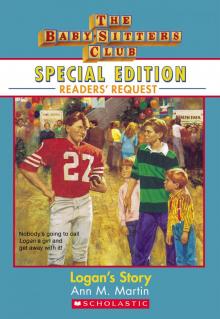 Logan's Story
Logan's Story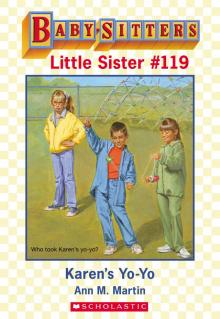 Karen's Yo-Yo
Karen's Yo-Yo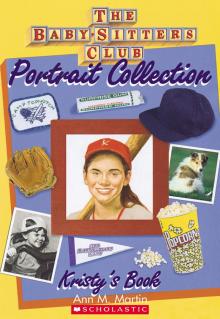 Kristy's Book
Kristy's Book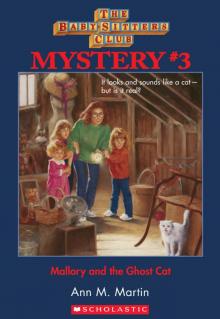 Mallory and the Ghost Cat
Mallory and the Ghost Cat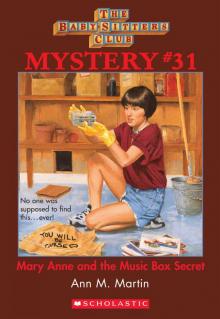 Mary Anne and the Music
Mary Anne and the Music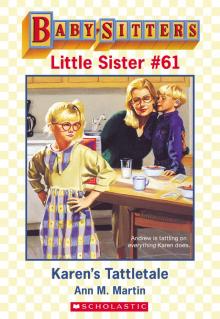 Karen's Tattletale
Karen's Tattletale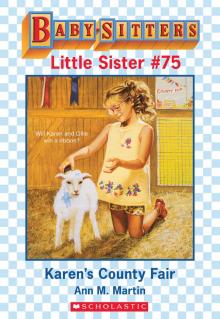 Karen's County Fair
Karen's County Fair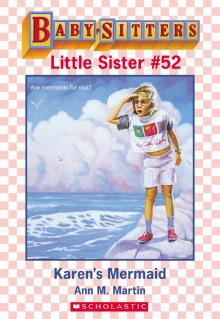 Karen's Mermaid
Karen's Mermaid Snowbound
Snowbound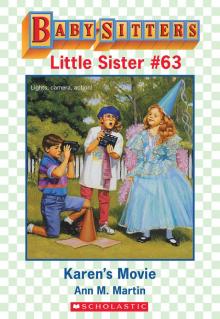 Karen's Movie
Karen's Movie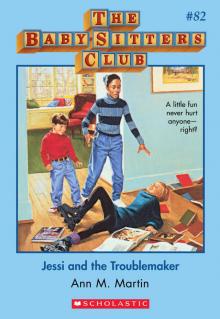 Jessi and the Troublemaker
Jessi and the Troublemaker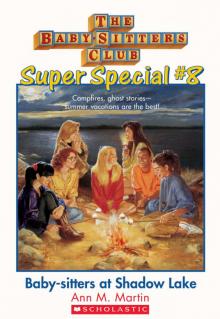 Baby-Sitters at Shadow Lake
Baby-Sitters at Shadow Lake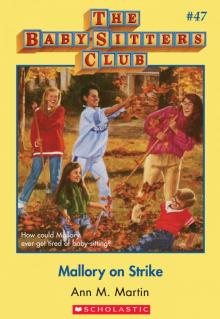 Mallory on Strike
Mallory on Strike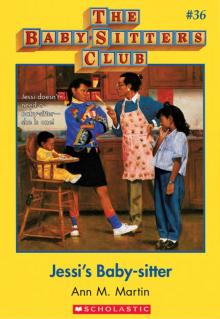 Jessi's Baby-Sitter
Jessi's Baby-Sitter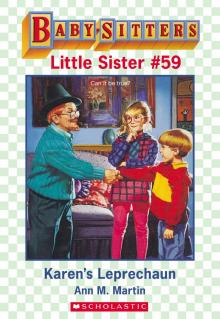 Karen's Leprechaun
Karen's Leprechaun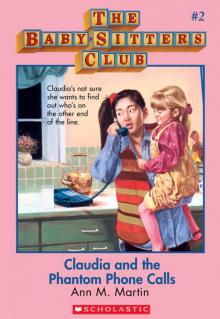 Claudia and the Phantom Phone Calls
Claudia and the Phantom Phone Calls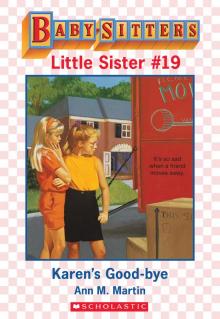 Karen's Good-Bye
Karen's Good-Bye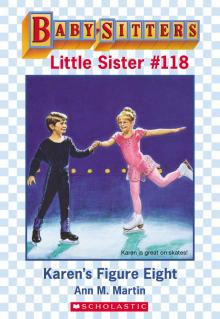 Karen's Figure Eight
Karen's Figure Eight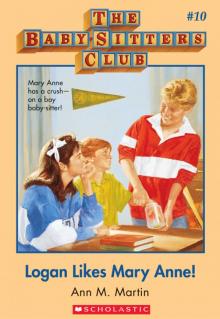 Logan Likes Mary Anne!
Logan Likes Mary Anne!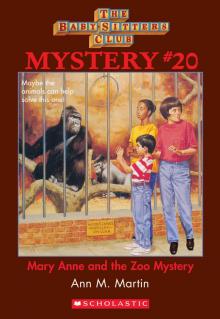 Mary Anne and the Zoo Mystery
Mary Anne and the Zoo Mystery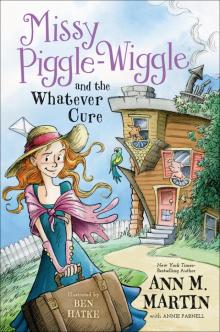 Missy Piggle-Wiggle and the Whatever Cure
Missy Piggle-Wiggle and the Whatever Cure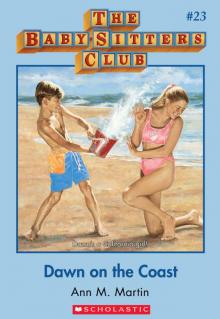 Dawn on the Coast
Dawn on the Coast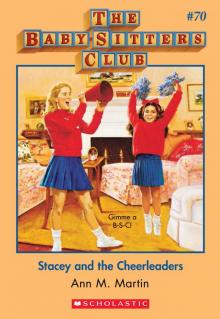 Stacey and the Cheerleaders
Stacey and the Cheerleaders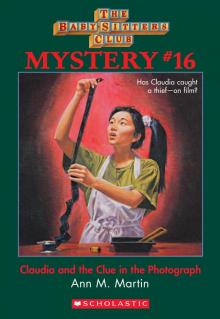 Claudia and the Clue in the Photograph
Claudia and the Clue in the Photograph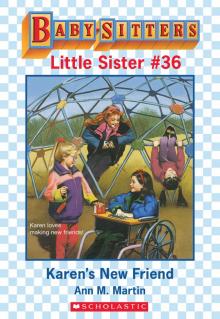 Karen's New Friend
Karen's New Friend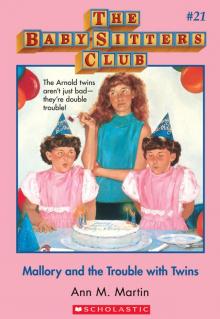 Mallory and the Trouble With Twins
Mallory and the Trouble With Twins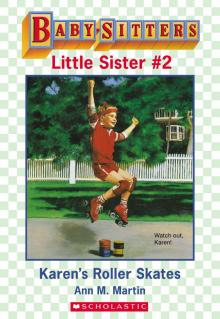 Karen's Roller Skates
Karen's Roller Skates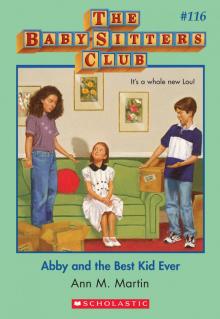 Abby and the Best Kid Ever
Abby and the Best Kid Ever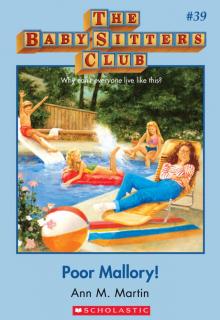 Poor Mallory!
Poor Mallory!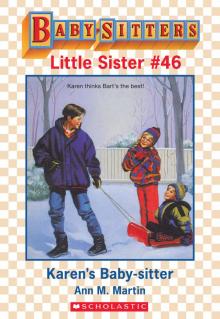 Karen's Witch
Karen's Witch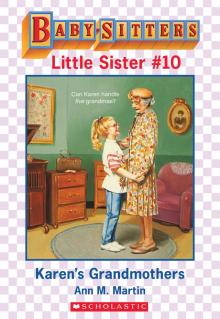 Karen's Grandmothers
Karen's Grandmothers Slam Book
Slam Book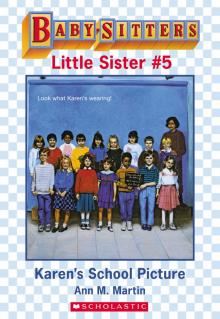 Karen's School Picture
Karen's School Picture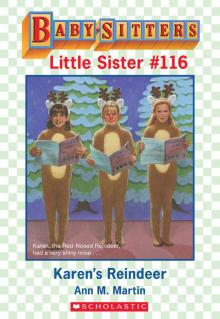 Karen's Reindeer
Karen's Reindeer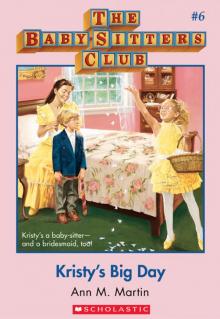 Kristy's Big Day
Kristy's Big Day The Long Way Home
The Long Way Home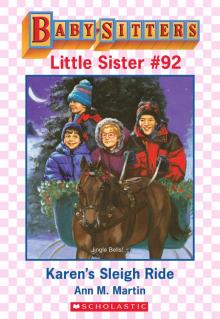 Karen's Sleigh Ride
Karen's Sleigh Ride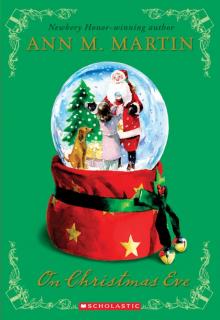 On Christmas Eve
On Christmas Eve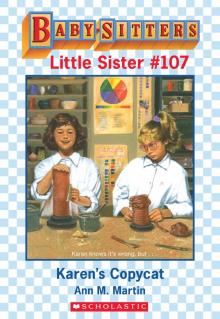 Karen's Copycat
Karen's Copycat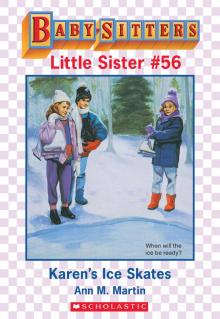 Karen's Ice Skates
Karen's Ice Skates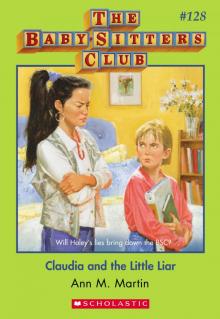 Claudia and the Little Liar
Claudia and the Little Liar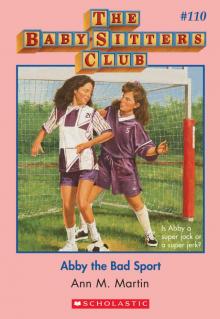 Abby the Bad Sport
Abby the Bad Sport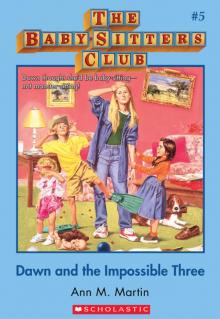 The Baby-Sitters Club #5: Dawn and the Impossible Three
The Baby-Sitters Club #5: Dawn and the Impossible Three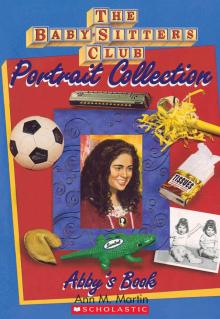 Abby's Book
Abby's Book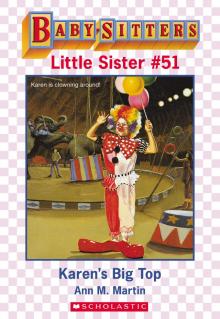 Karen's Big Top
Karen's Big Top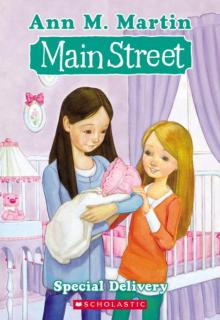 Main Street #8: Special Delivery
Main Street #8: Special Delivery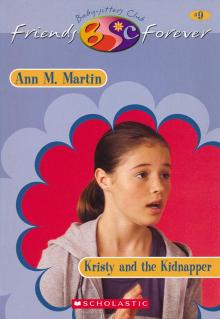 Kristy and the Kidnapper
Kristy and the Kidnapper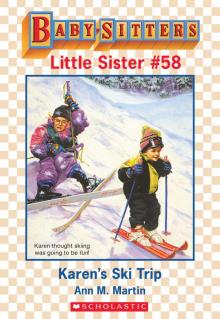 Karen's Ski Trip
Karen's Ski Trip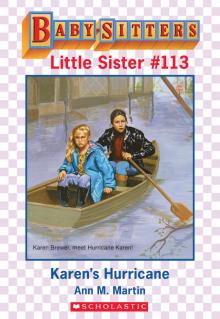 Karen's Hurricane
Karen's Hurricane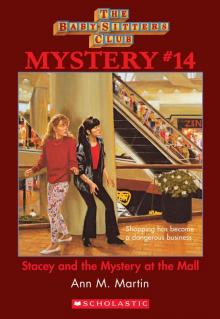 Stacey and the Mystery at the Mall
Stacey and the Mystery at the Mall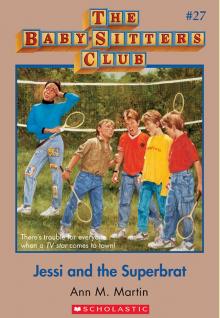 Jessi and the Superbrat
Jessi and the Superbrat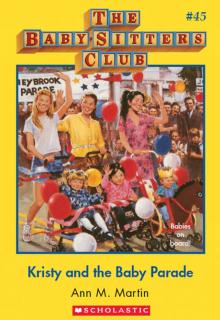 Kristy and the Baby Parade
Kristy and the Baby Parade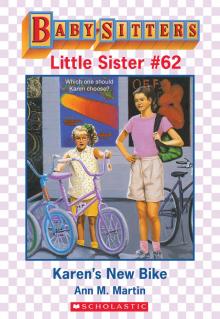 Karen's New Bike
Karen's New Bike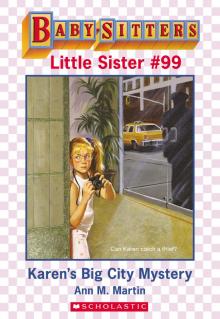 Karen's Big City Mystery
Karen's Big City Mystery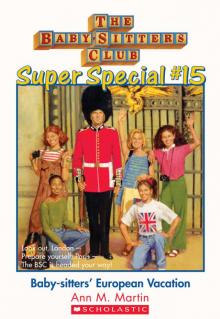 Baby-Sitters' European Vacation
Baby-Sitters' European Vacation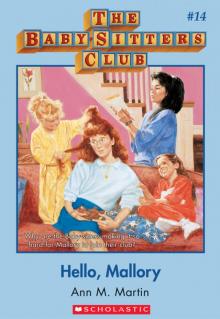 Hello, Mallory
Hello, Mallory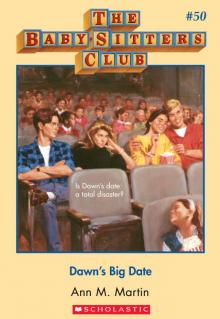 Dawn's Big Date
Dawn's Big Date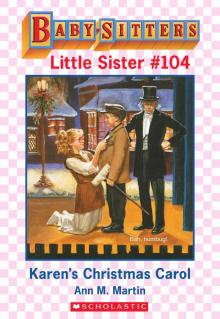 Karen's Christmas Carol
Karen's Christmas Carol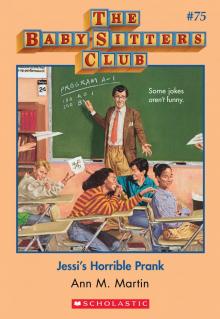 Jessi's Horrible Prank
Jessi's Horrible Prank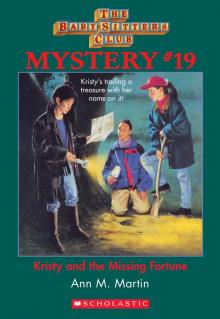 Kristy and the Missing Fortune
Kristy and the Missing Fortune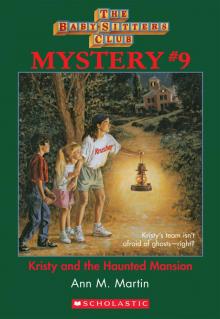 Kristy and the Haunted Mansion
Kristy and the Haunted Mansion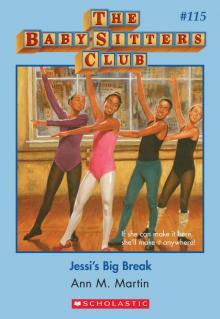 Jessi's Big Break
Jessi's Big Break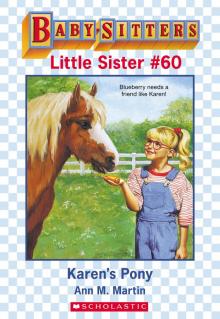 Karen's Pony
Karen's Pony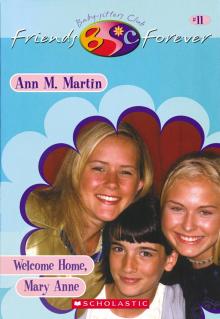 Welcome Home, Mary Anne
Welcome Home, Mary Anne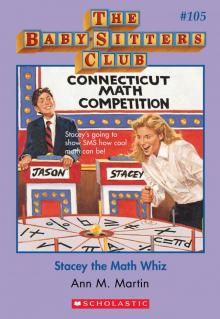 Stacey the Math Whiz
Stacey the Math Whiz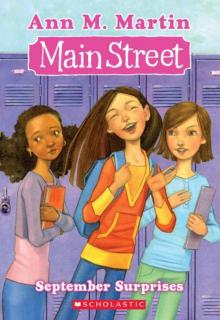 September Surprises
September Surprises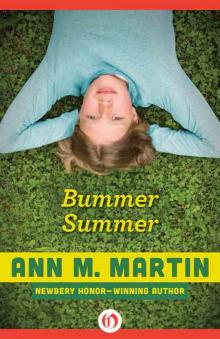 Bummer Summer
Bummer Summer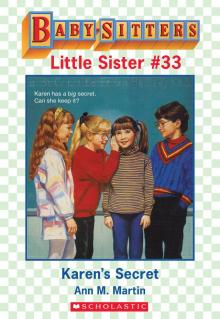 Karen's Secret
Karen's Secret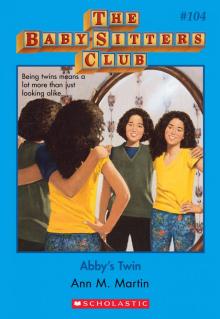 Abby's Twin
Abby's Twin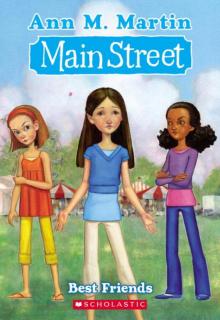 Main Street #4: Best Friends
Main Street #4: Best Friends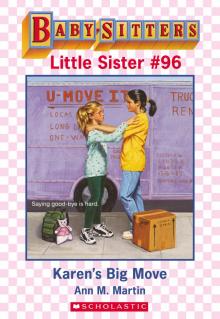 Karen's Big Move
Karen's Big Move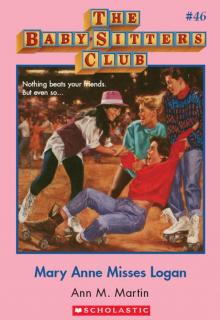 Mary Anne Misses Logan
Mary Anne Misses Logan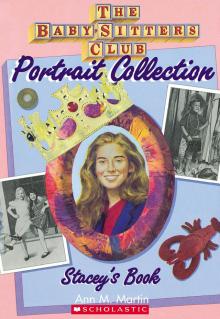 Stacey's Book
Stacey's Book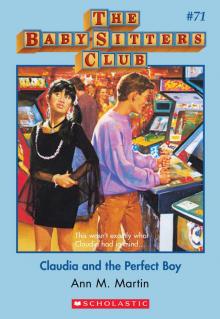 Claudia and the Perfect Boy
Claudia and the Perfect Boy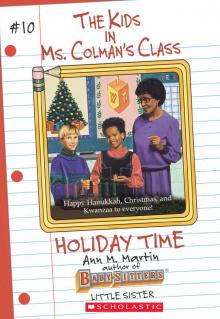 Holiday Time
Holiday Time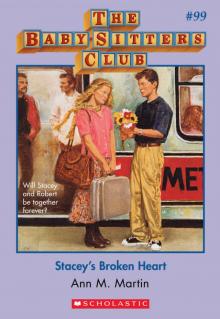 Stacey's Broken Heart
Stacey's Broken Heart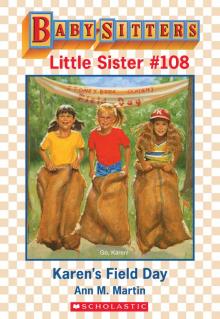 Karen's Field Day
Karen's Field Day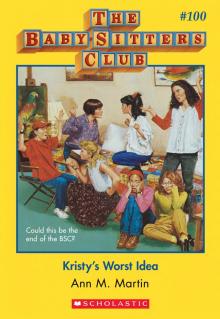 Kristy's Worst Idea
Kristy's Worst Idea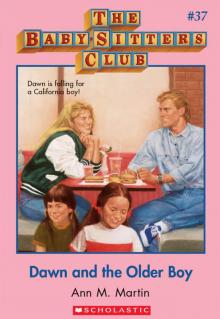 Dawn and the Older Boy
Dawn and the Older Boy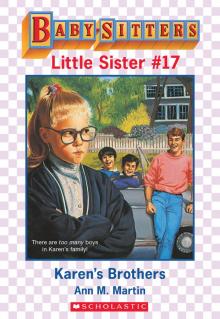 Karen's Brothers
Karen's Brothers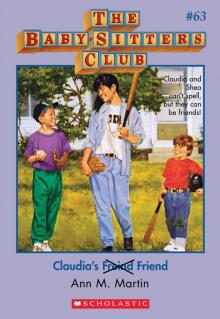 Claudia's Friend
Claudia's Friend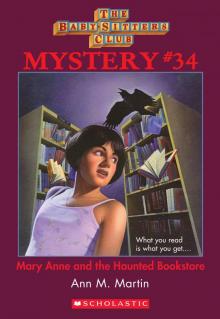 Mary Anne and the Haunted Bookstore
Mary Anne and the Haunted Bookstore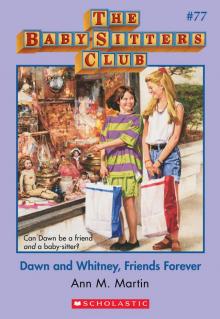 Dawn and Whitney, Friends Forever
Dawn and Whitney, Friends Forever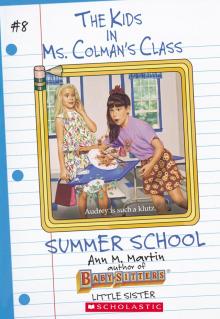 Summer School
Summer School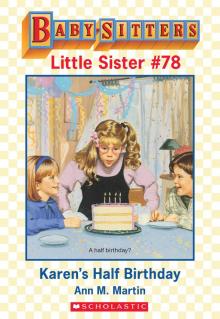 Karen's Birthday
Karen's Birthday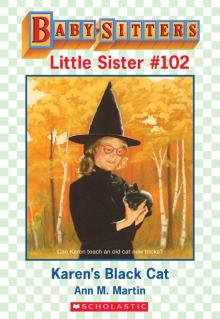 Karen's Black Cat
Karen's Black Cat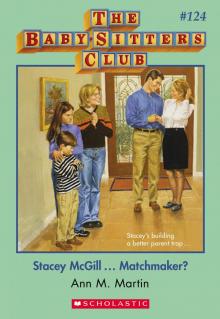 Stacey McGill... Matchmaker?
Stacey McGill... Matchmaker? Claudia's Book
Claudia's Book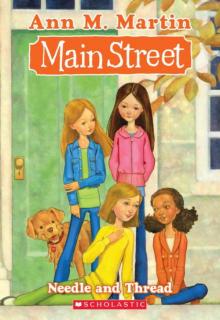 Main Street #2: Needle and Thread
Main Street #2: Needle and Thread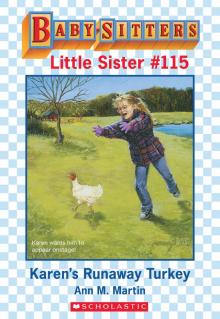 Karen's Runaway Turkey
Karen's Runaway Turkey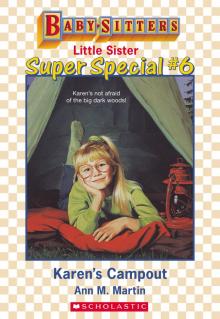 Karen's Campout
Karen's Campout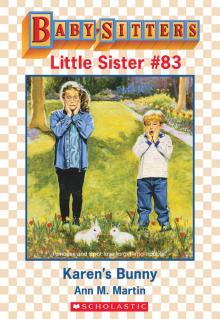 Karen's Bunny
Karen's Bunny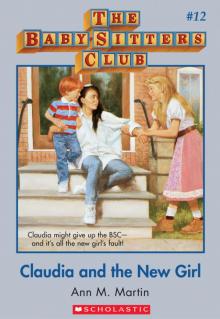 Claudia and the New Girl
Claudia and the New Girl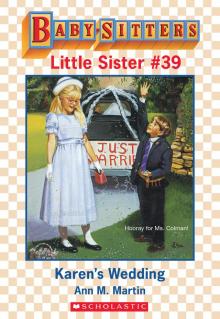 Karen's Wedding
Karen's Wedding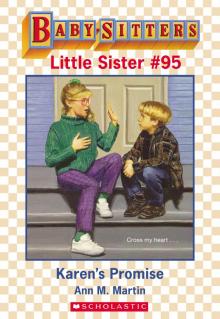 Karen's Promise
Karen's Promise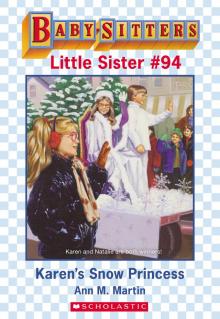 Karen's Snow Princess
Karen's Snow Princess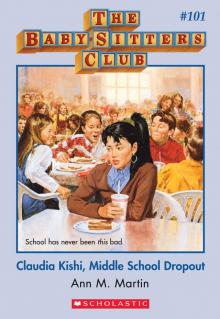 Claudia Kishi, Middle School Dropout
Claudia Kishi, Middle School Dropout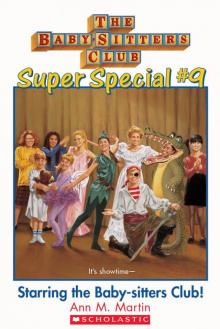 Starring the Baby-Sitters Club!
Starring the Baby-Sitters Club!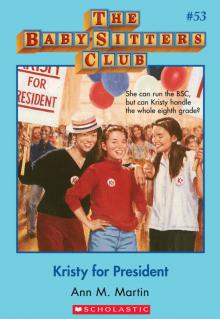 Kristy for President
Kristy for President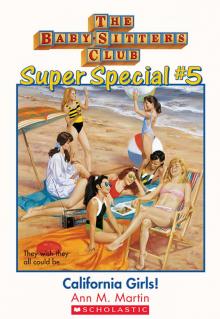 California Girls!
California Girls!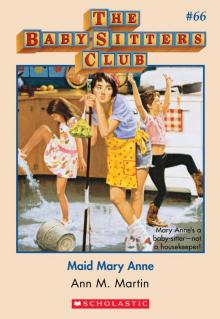 Maid Mary Anne
Maid Mary Anne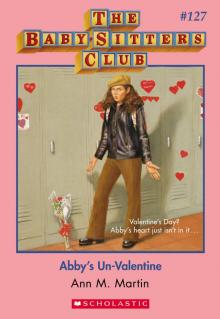 Abby's Un-Valentine
Abby's Un-Valentine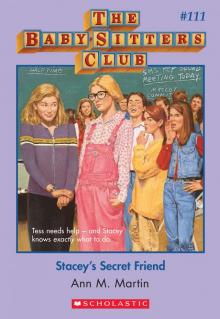 Stacey's Secret Friend
Stacey's Secret Friend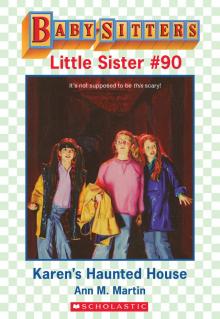 Karen's Haunted House
Karen's Haunted House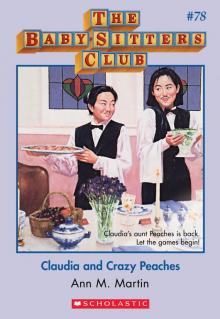 Claudia and Crazy Peaches
Claudia and Crazy Peaches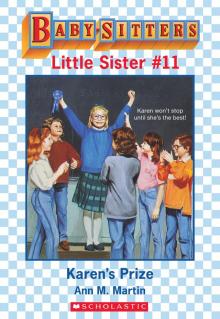 Karen's Prize
Karen's Prize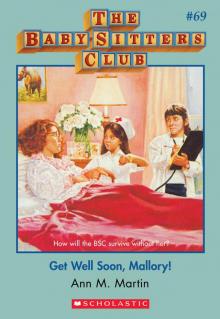 Get Well Soon, Mallory!
Get Well Soon, Mallory!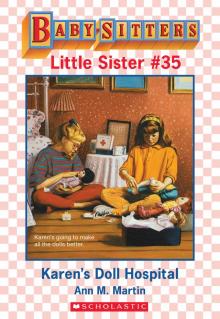 Karen's Doll Hospital
Karen's Doll Hospital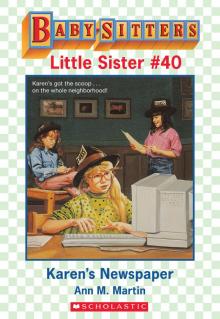 Karen's Newspaper
Karen's Newspaper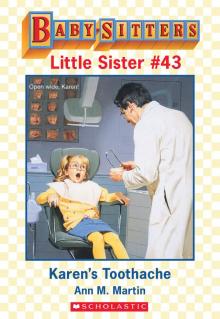 Karen's Toothache
Karen's Toothache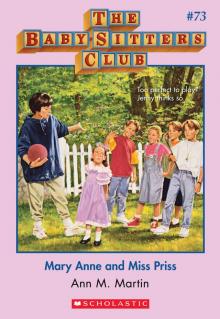 Mary Anne and Miss Priss
Mary Anne and Miss Priss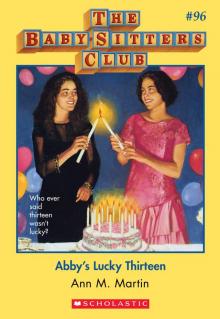 Abby's Lucky Thirteen
Abby's Lucky Thirteen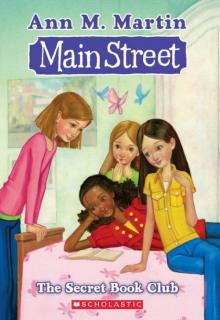 The Secret Book Club
The Secret Book Club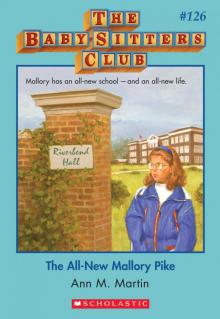 The All-New Mallory Pike
The All-New Mallory Pike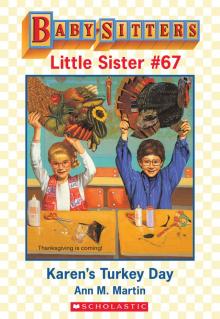 Karen's Turkey Day
Karen's Turkey Day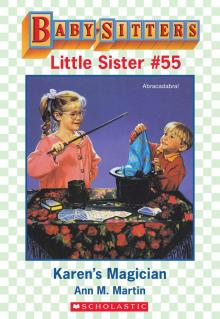 Karen's Magician
Karen's Magician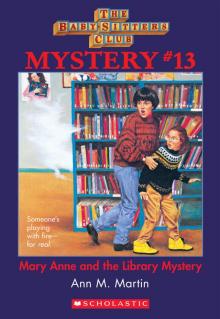 Mary Anne and the Library Mystery
Mary Anne and the Library Mystery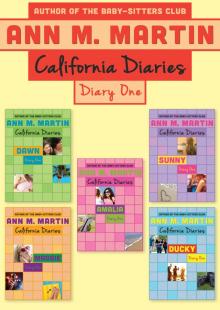 Diary One: Dawn, Sunny, Maggie, Amalia, and Ducky
Diary One: Dawn, Sunny, Maggie, Amalia, and Ducky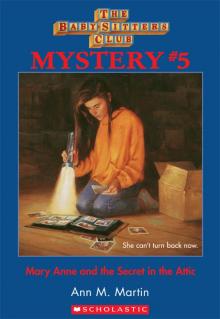 Mary Anne and the Secret in the Attic
Mary Anne and the Secret in the Attic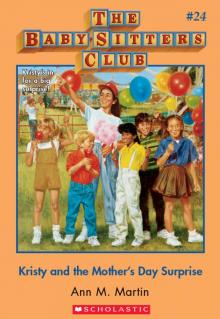 Kristy and the Mother's Day Surprise
Kristy and the Mother's Day Surprise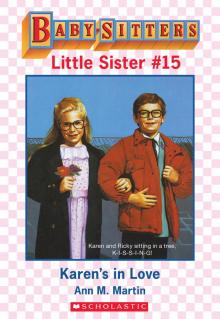 Karen's in Love
Karen's in Love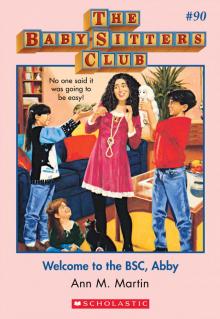 Welcome to the BSC, Abby
Welcome to the BSC, Abby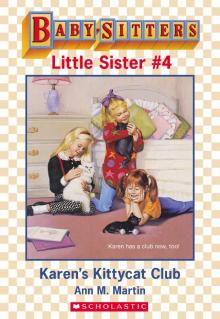 Karen's Kittycat Club
Karen's Kittycat Club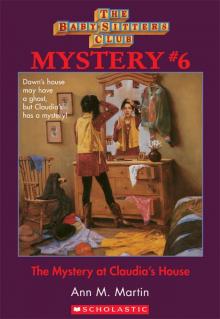 The Mystery at Claudia's House
The Mystery at Claudia's House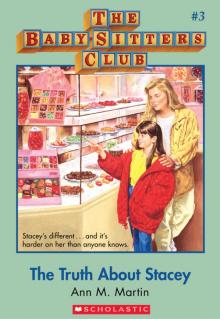 The Truth About Stacey
The Truth About Stacey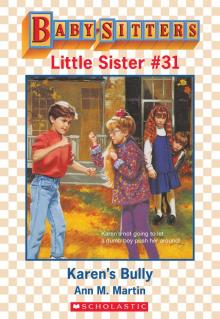 Karen's Bully
Karen's Bully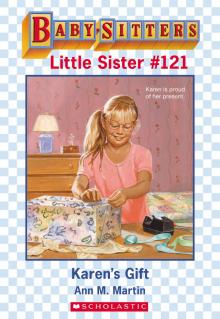 Karen's Gift
Karen's Gift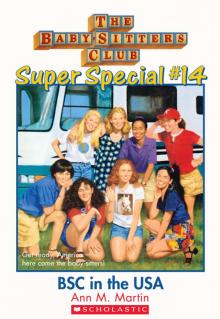 BSC in the USA
BSC in the USA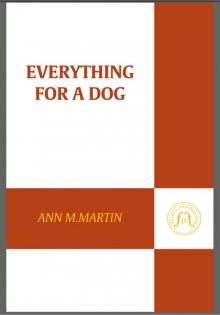 Everything for a Dog
Everything for a Dog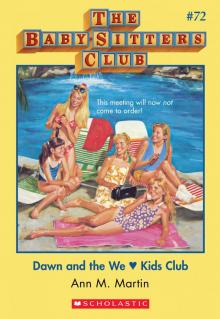 Dawn and the We Love Kids Club
Dawn and the We Love Kids Club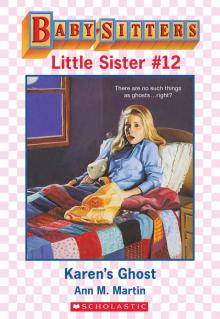 Karen's Ghost
Karen's Ghost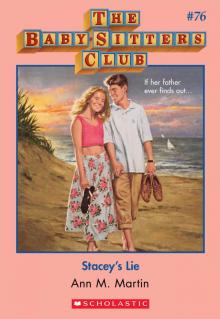 Stacey's Lie
Stacey's Lie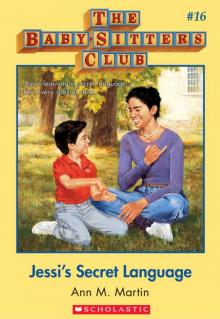 Jessi's Secret Language
Jessi's Secret Language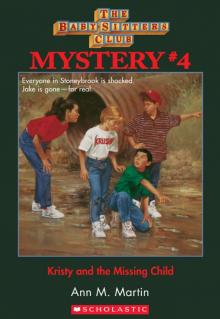 Kristy and the Missing Child
Kristy and the Missing Child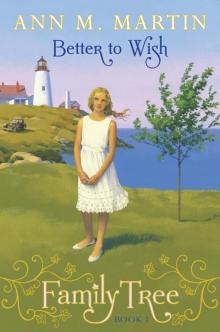 Better to Wish
Better to Wish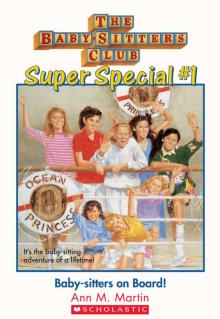 Baby-Sitters on Board!
Baby-Sitters on Board!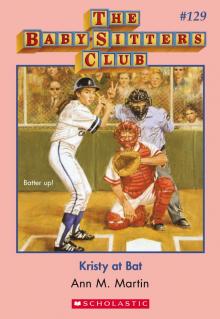 Kristy at Bat
Kristy at Bat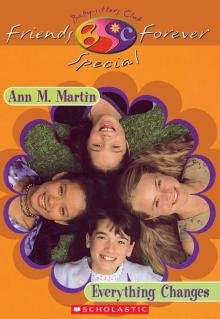 Everything Changes
Everything Changes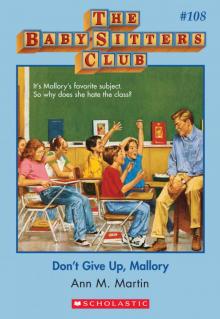 Don't Give Up, Mallory
Don't Give Up, Mallory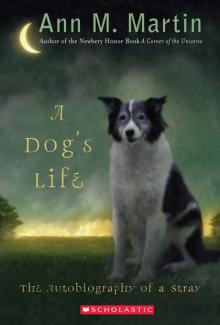 A Dog's Life: The Autobiography of a Stray
A Dog's Life: The Autobiography of a Stray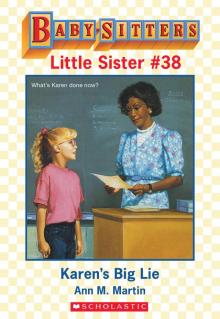 Karen's Big Lie
Karen's Big Lie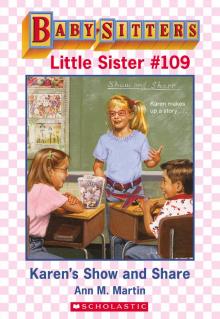 Karen's Show and Share
Karen's Show and Share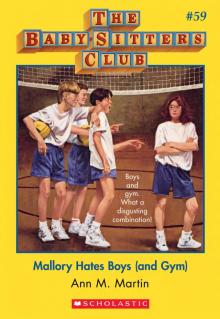 Mallory Hates Boys (and Gym)
Mallory Hates Boys (and Gym)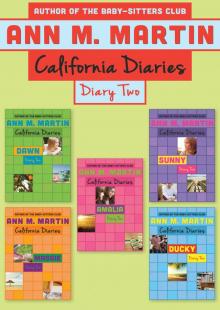 Diary Two: Dawn, Sunny, Maggie, Amalia, and Ducky
Diary Two: Dawn, Sunny, Maggie, Amalia, and Ducky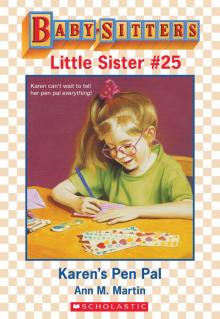 Karen's Pen Pal
Karen's Pen Pal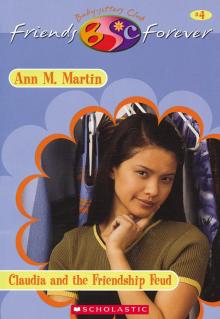 Claudia and the Friendship Feud
Claudia and the Friendship Feud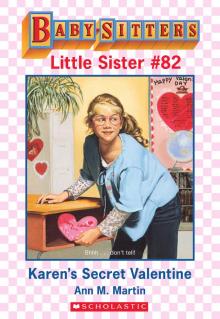 Karen's Secret Valentine
Karen's Secret Valentine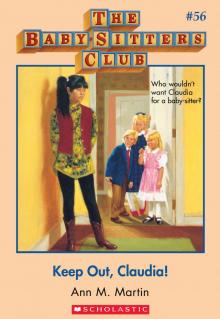 Keep Out, Claudia!
Keep Out, Claudia!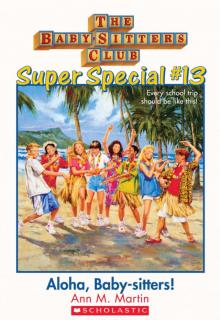 Aloha, Baby-Sitters!
Aloha, Baby-Sitters!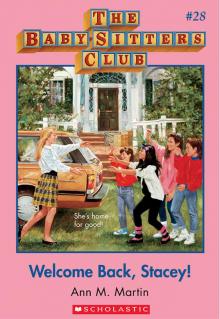 Welcome Back, Stacey
Welcome Back, Stacey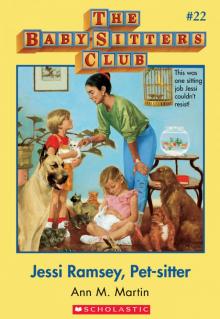 Jessi Ramsey, Pet-Sitter
Jessi Ramsey, Pet-Sitter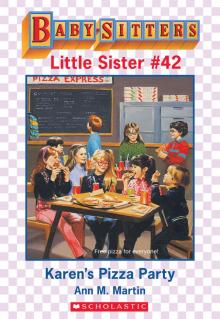 Karen's Pizza Party
Karen's Pizza Party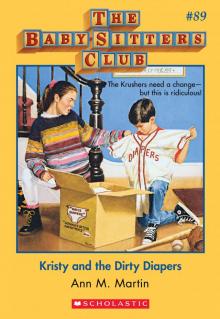 Kristy and the Dirty Diapers
Kristy and the Dirty Diapers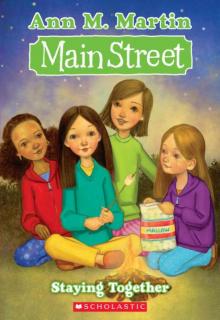 Staying Together
Staying Together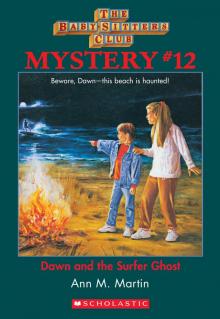 Dawn and the Surfer Ghost
Dawn and the Surfer Ghost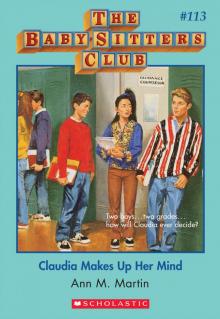 Claudia Makes Up Her Mind
Claudia Makes Up Her Mind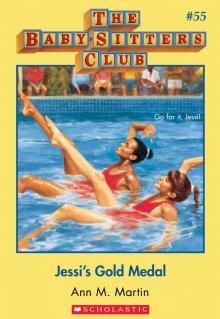 Jessi's Gold Medal
Jessi's Gold Medal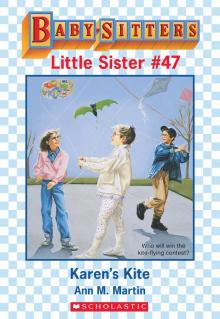 Karen's Kite
Karen's Kite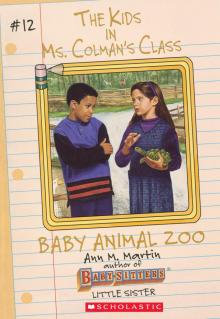 Baby Animal Zoo
Baby Animal Zoo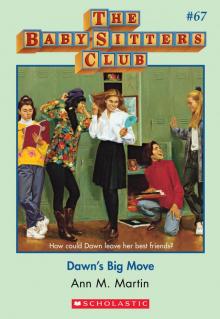 Dawn's Big Move
Dawn's Big Move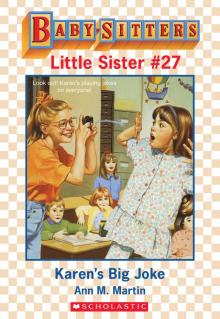 Karen's Big Joke
Karen's Big Joke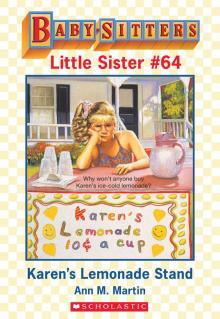 Karen's Lemonade Stand
Karen's Lemonade Stand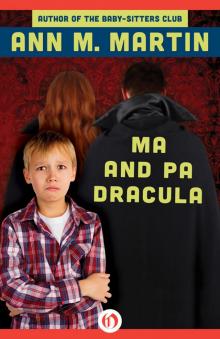 Ma and Pa Dracula
Ma and Pa Dracula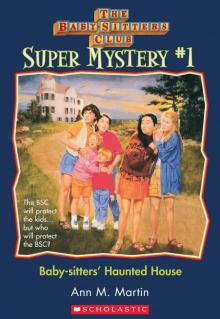 Baby-Sitters' Haunted House
Baby-Sitters' Haunted House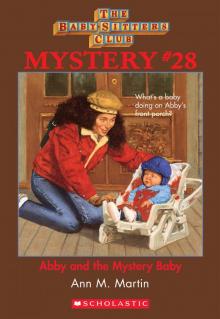 Abby and the Mystery Baby
Abby and the Mystery Baby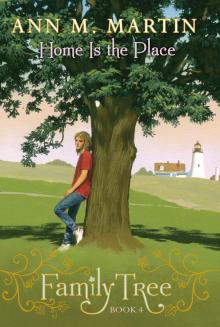 Home Is the Place
Home Is the Place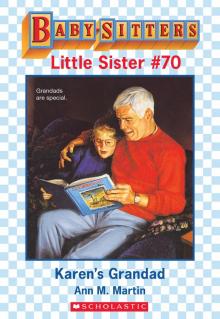 Karen's Grandad
Karen's Grandad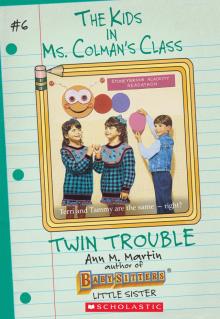 Twin Trouble
Twin Trouble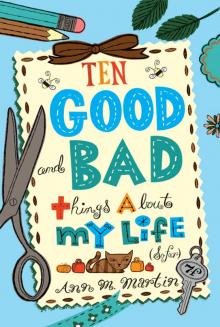 Ten Good and Bad Things About My Life (So Far)
Ten Good and Bad Things About My Life (So Far)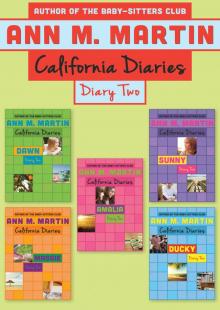 Diary Two
Diary Two Baby-Sitters Club 027
Baby-Sitters Club 027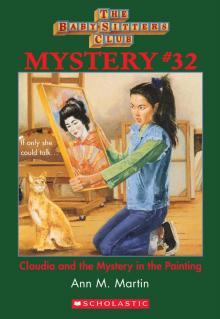 Claudia and the Mystery Painting
Claudia and the Mystery Painting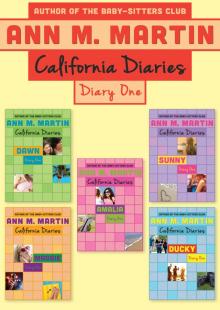 Diary One
Diary One Baby-Sitters Club 037
Baby-Sitters Club 037 Baby-Sitters Club 028
Baby-Sitters Club 028 Baby-Sitters Club 085
Baby-Sitters Club 085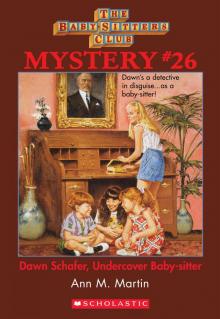 Dawn Schaffer Undercover Baby-Sitter
Dawn Schaffer Undercover Baby-Sitter Jessi's Babysitter
Jessi's Babysitter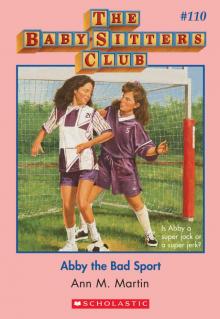 The Baby-Sitters Club #110: Abby the Bad Sport (Baby-Sitters Club, The)
The Baby-Sitters Club #110: Abby the Bad Sport (Baby-Sitters Club, The) Karen's Little Sister
Karen's Little Sister Baby-Sitters Club 058
Baby-Sitters Club 058 Claudia And The Genius On Elm St.
Claudia And The Genius On Elm St.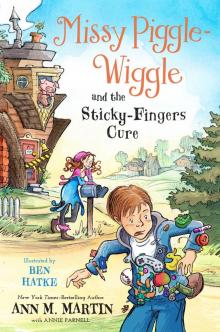 Missy Piggle-Wiggle and the Sticky-Fingers Cure
Missy Piggle-Wiggle and the Sticky-Fingers Cure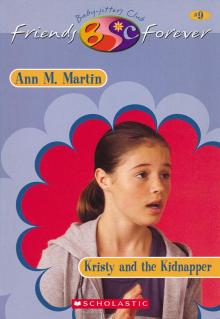 Kristy and Kidnapper
Kristy and Kidnapper Baby-Sitters Club 041
Baby-Sitters Club 041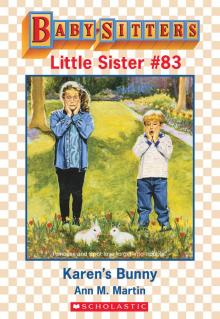 Karen's Bunny Trouble
Karen's Bunny Trouble Baby-Sitters Club 032
Baby-Sitters Club 032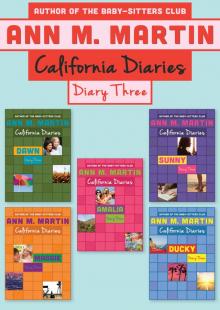 Diary Three
Diary Three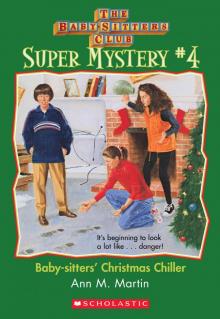 Christmas Chiller
Christmas Chiller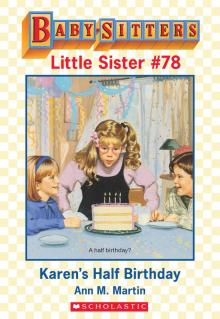 Karen's Half-Birthday
Karen's Half-Birthday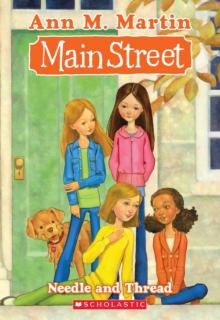 Needle and Thread
Needle and Thread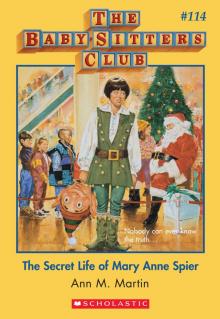 Secret Life of Mary Anne Spier
Secret Life of Mary Anne Spier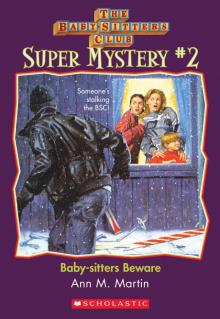 Baby-Sitters Beware
Baby-Sitters Beware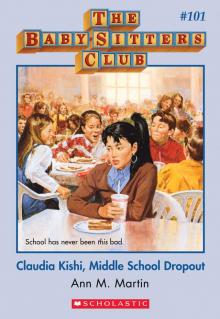 Claudia Kishi, Middle School Drop-Out
Claudia Kishi, Middle School Drop-Out Logan Likes Mary Anne !
Logan Likes Mary Anne ! Baby-Sitters Club 061
Baby-Sitters Club 061 Best Friends
Best Friends Baby-Sitters Club 031
Baby-Sitters Club 031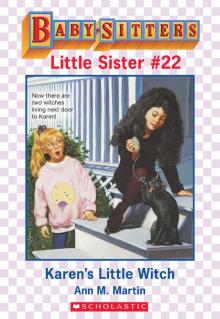 Karen's Little Witch
Karen's Little Witch Jessi Ramsey, Petsitter
Jessi Ramsey, Petsitter Baby-Sitters Club 123
Baby-Sitters Club 123 Baby-Sitters Club 059
Baby-Sitters Club 059 Baby-Sitters Club 033
Baby-Sitters Club 033 Baby-Sitters Club 060
Baby-Sitters Club 060 Baby-Sitters Club 094
Baby-Sitters Club 094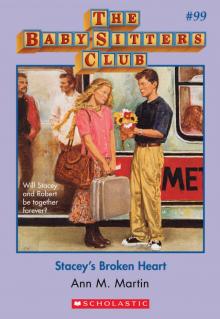 The Baby-Sitters Club #99: Stacey's Broken Heart
The Baby-Sitters Club #99: Stacey's Broken Heart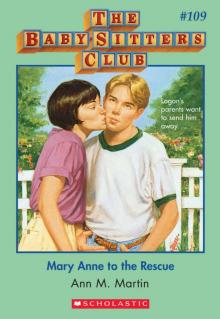 The Baby-Sitters Club #109: Mary Anne to the Rescue (Baby-Sitters Club, The)
The Baby-Sitters Club #109: Mary Anne to the Rescue (Baby-Sitters Club, The) Mystery At Claudia's House
Mystery At Claudia's House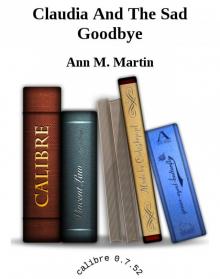 Claudia And The Sad Goodbye
Claudia And The Sad Goodbye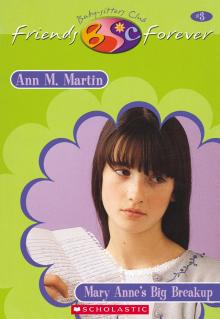 Mary Anne's Big Break-Up
Mary Anne's Big Break-Up Baby-Sitters Club 025
Baby-Sitters Club 025 Baby-Sitters Club 042
Baby-Sitters Club 042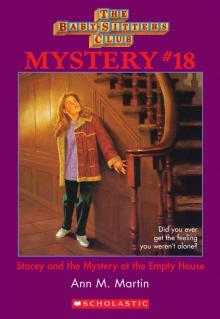 Stacey and the Mystery of the Empty House
Stacey and the Mystery of the Empty House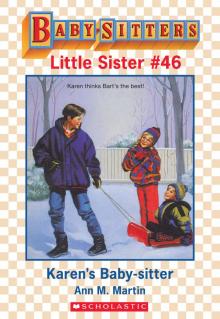 Karen's Baby-Sitter
Karen's Baby-Sitter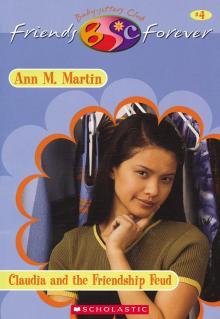 Claudia's Friendship Feud
Claudia's Friendship Feud Baby-Sitters Club 090
Baby-Sitters Club 090 Baby-Sitters Club 021
Baby-Sitters Club 021 Baby-Sitters Club 056
Baby-Sitters Club 056 Baby-Sitters Club 040
Baby-Sitters Club 040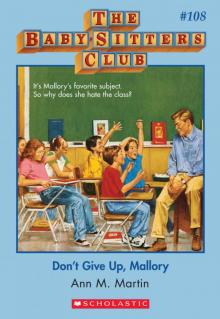 The Baby-Sitters Club #108: Don't Give Up, Mallory (Baby-Sitters Club, The)
The Baby-Sitters Club #108: Don't Give Up, Mallory (Baby-Sitters Club, The)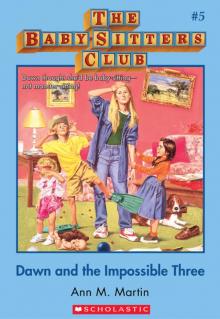 Dawn and the Impossible Three
Dawn and the Impossible Three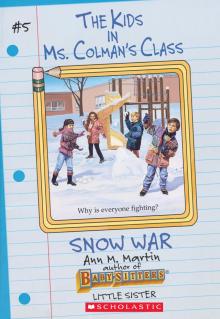 The Snow War
The Snow War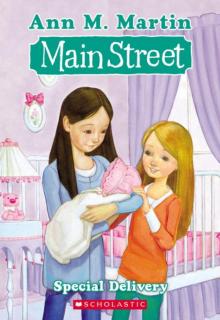 Special Delivery
Special Delivery Baby-Sitters Club 057
Baby-Sitters Club 057 Mary Anne And Too Many Babies
Mary Anne And Too Many Babies Baby-Sitters Club 030
Baby-Sitters Club 030